Business
New Huge Medical Campus, 1200 new jobs; Two Autonomous Vehicle Companies; and National Attention
Published
4 years agoon
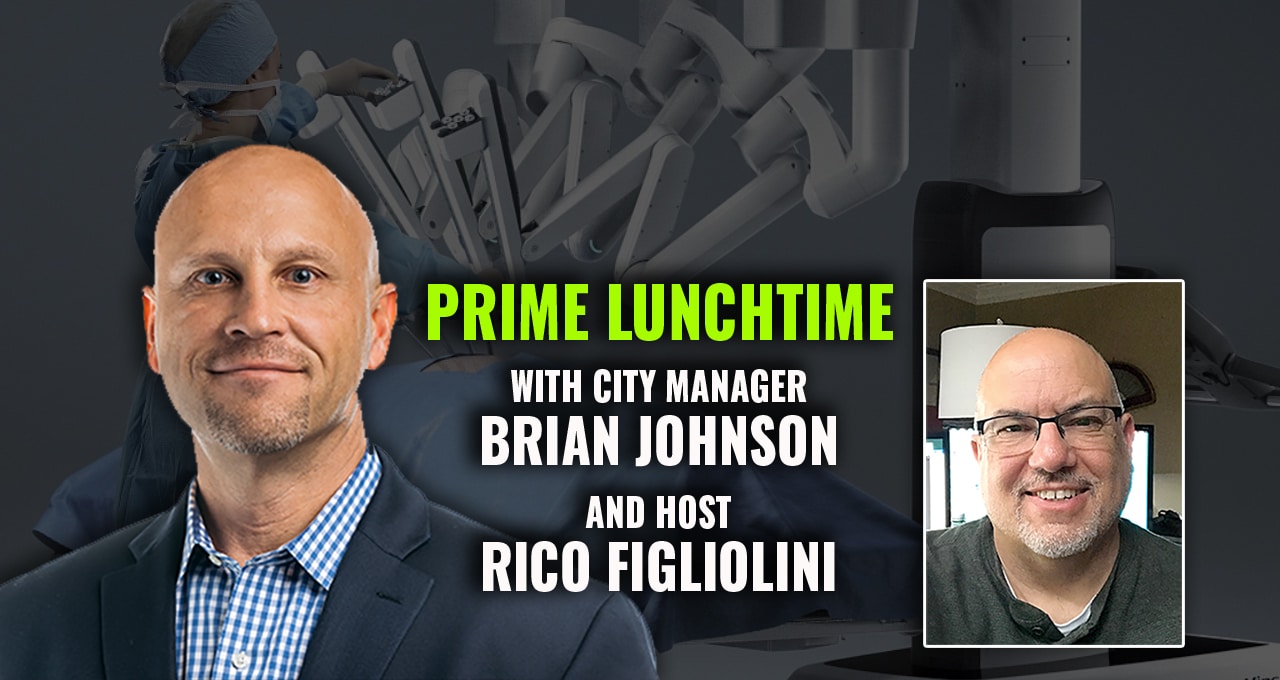
What company just announced a $500 Million investment to build a medical campus in Peachtree Corners and add 1200 new jobs to the area? What 2 models of autonomous vehicles will make their debut in late August on Curiosity Lab’s 5G enabled 3.0-mile test track? Plus trees, trees, trees. Some talk about Georgia Power and continued tree removal and trimming.
Timestamp:
[00:00:30] – Opening
[00:01:28] – Intuitive Surgical Coming to Peachtree Corners
[00:33:04] – New Autonomous Vehicles
[00:39:42] – Georgia Power Tree Removal
[00:48:14] – Closing
“I know I beat the drum of Curiosity Lab merely because this magnet for activity that we created has a name. Other people have named things too at different times with different things. But I bring it up just so that the residents here are kept updated on the benefits that we derive from having a reason for certain companies to come and kick the tires here.”
Brian johnson
podcast transcript:
Rico: [00:00:30] Hi everyone. This is Rico Figliolini host of Peachtree Corners Life, and today with Prime Lunchtime with the City Manager, Brian Johnson. Before we get into that, just want to say thank you for everyone’s support on Peachtree Corners Magazine, which is a host of these podcasts. And also that today we’ll be talking about some really exciting news that’s going to be happening over the next few days. Certainly one that was announced today about a company here in Peachtree Corners that is going to be expanding into huge medical campus. So we’re going to be discussing that. We’re also going to be discussing a little bit about Curiosity Lab and the new vehicles that are going to be happening and coming this year to Technology Park. So we’ll be discussing that as well. For the first time in the expanded probably the largest amount of autonomous vehicles on live, living, street like ours in the nation, if not in the country, but certainly in the nation. So we’re going to be talking about those things today. So let me bring on Brian, thanks for joining me.
Brian: [00:01:27] Thanks for having me.
Rico: [00:01:28] Yeah, this is good. Every month that we do this it gets people to know a little bit more about what’s going on in Peachtree Corners. Also, I just want to remind people that I make my commentaries because I make my commentaries. This is my show. and if I have a comment about something I’m going to make it. People will disagree, but I just want people to understand Peachtree Corners Life, Prime Lunchtime with the City Manager, it’s something where I can make my comments about issues of the day. And I just want people to know that. Let’s talk about the first thing that’s happening, which is unbelievable. You were telling me, sharing with me this morning a little bit about it just before the show. And it’s a company that has existed here that’s based in Silicon valley, has an office here, but this is a huge thing that’s happening. So tell us what happened today with the governor and all this.
Brian: [00:02:14] Well, let me back up six months and start this story because there was a big announcement by the state of Georgia about a company that exists here in Peachtree Corners called Intuitive, a publicly traded company. And they are a maker of robotic assisted surgical suites. There’s a number of them. The most famous, if you will, the one that’s sold the most units, most prevalent out there is called the DaVinci device. And this is a operating suite in which the patient sits underneath a covering in which there are four arms that come out. And this is used for patients that are undergoing soft tissue surgery. So it’s not for your bones. And oftentimes it’s a very complicated surgery that would normally either require a very, very, granular level of skill. Like say excising a tumor around something that’s very sensitive. Or it would normally require cracking somebody’s chest open, like splitting them all the way to get to some organ that’s difficult to get to. Instead they put in four ports, if you will. Almost like the size of a straw, maybe a little bit bigger into the torso, the area that they’re going to operate. One of them contains a camera and the other three contain arms. Almost like a snake in that once it’s through the port, into the body, the head of that device can move wherever and they can snake it wherever they need to. And then the end of it has removable tips. It could be a blade. It could be scissors. It could be claws, it could be a cauterizing device. And so it can go places in there in a less invasive way then cracking the thing open. The other interesting part about the DaVinci device is the surgeon is actually not over the patient. The surgeon is sitting next to the patient, looking into, goggles with their hands, into these grips and what their hands are doing is what’s actually happening next to them inside the body. And they look in the camera.
Rico: [00:04:41] That’s amazing.
Brian: [00:04:41] It is amazing.
Rico: [00:04:43] It’s almost like virtual reality working on a patient.
Brian: [00:04:46] Robotic assisted surgery is certainly the wave of the future and where there’s going to be more and more of it. So, you know, it’s used for those types of things. This company is headquartered in Sunnyvale, California. And about six months ago, they started a process of building an east coast campus. They did not want to expand in California, they are in a very aggressive expansion mode. And a lot of it is because they are doing very well and they have market share in this particular market and they want to get in to hospitals while the competition is as far behind them as they currently are. So they’re in an aggressive expansion mode. They decided they did not want to expand into California for their own reasons. And so they started a process of identifying where on the east coast they wanted to go. And so about six months ago, they approached the city and they informed us, essentially that they were taking a look at places. And prior to, and to a degree, sometime after they did make their decision, which they said would be in the not too distant future. They also informed us that they had purchased one of the buildings right behind where their current office is.
Rico: [00:06:19] Which for those people that don’t know is across from the post office.
Brian: [00:06:23] Right next to the USTA building on Spalding, basically at the corner of Spalding and Data drive. And they also, one of the buildings they purchased behind there, the one directly on Spalding, they wanted to gut it and they want to start assembling the DaVinci devices at this. Not manufacturing it, but taking all the component and chip sets and having engineers assemble them together and then do quality control testing. And then when a hospital buys the device, the device ships to the hospital. Then they install the device in the hospital. And then part of the purchase is, there is training by surgeons that go and get trained on how to use the device from hospitals that bought it. And when they invited us over there, the ‘they’ is the mayor and I, they actually walked us through their current facility. And that building that’s right on Spalding is unique in that one of the floors we had to essentially get covered, almost like scrubbing into surgery, to walk down one of the halls. The reason we had to do it is because it’s set up, it almost looks like a hospital. If you’re walking down the hallway of a hospital. And each of the rooms down the hall actually had a surgical room in it, a surgical suite with the DaVinci device and on the operating table was a cadaver. And that’s where surgeons come in and they actually practice using the DaVinci device and get trained and certified in how to use it. And then they go back to the hospital and they start using them for surgeries. Right here in Peachtree Corners. And the mayor and I were both like, we knew what Intuitive was, but we didn’t know what all they were doing here. So they’re going to assemble those devices and then they’re going to do it on the east coast. So we knew there were at least going to do that. But they said, look, this assembly that we’re wanting to set up, it’s like temporary. We are really in a rush to get it up and running, because again, we have market share. Whatever location we choose as our east coast headquarters, that’s going to be where we’re going to build the permanent assembly plant. So we were like, okay, this is temporary. Whether they expand here or not, it’s temporary, but so they talked to us about speed. And so we started, I gave them some assurances, talk to my staff, and we started doing the permitting. Well concurrent to that, they started a process of elimination, ‘they’ being Intuitive. And got the locations that they wanted to expand to down to two locations, one here in Peachtree Corners and one in a city in the research triangle area of North Carolina. Raleigh, Durham, Chapel Hill area. And when they got it down to that, those two, then they retained a firm, Deloitte, to be their agent and they officially submitted an investment commitment to both states and they asked the state to come back with the state’s incentive package. What Intuitive committed to in their investment proposal was for them to create about a $600 million campus and to create 1200 or more jobs with an average salary of these 1200 or more jobs of $130,000.
Rico: [00:10:21] It’s just phenomenal. That’s better than Amazon. It’s unbelievable. So they’re going to have a big campus. How big is this campus going to be?
Brian: [00:10:30] I can’t remember. I want to say it’s going to be like six buildings- ish. So what you’re going to have here is you’re going to have the assembly building where they’re assembling. Their sales team for the east coast is going to operate out of here. They’re going to have research and development at this location. They’re going to have a number, not all, but some of their C-suite people are going to be here. The chief technology officer, the chief operating officer, chief sales officer, all those C-suite. Some of them are going to come here. They’re going to also have all of their training. So another by-product of this is they’re building a much larger version of that floor that I just told you, for people to come in, for surgeons to come in and train. And so the turnover on a regular basis of surgeons coming into the city to train for a week or more, depending on what level, they’re staying in our local hotels.
Rico: [00:11:39] And they’re coming from all over the country.
Brian: [00:11:40] They’re all over the east coast, however far there. But they’re coming from all over the country. But again, they come to the city for a temporary period of time and they’re going to stay in our hotels. So we not only have permanent 1200 or more jobs at the average salary that they are, but then you’ve got all of this reoccurring temporary hotel activity of these surgeons coming into town to get trained. And yes, this was a very interesting project. And so the state of Georgia. said, receive, we’ll get back to you. And we started the process. And so the city, the county, and the state. Well, we first got together and we came up with an incentive package that we would offer back. And the incentive package was presented to Intuitive at an all day meeting amongst representatives from the city, the county, and the state, and from the department of economic development. And then Intuitive had some senior people fly in from Sunnyvale, led by their chief finance officer. And the purpose was to talk incentives. And what was strong enough? What was it? All that kind of stuff. And Deloitte, they had a number of representatives from Deloitte, from various offices in the country that concentrated on certain things and we presented ours. And, the mirror image of this happened in North Carolina.
Rico: [00:13:13] Sure. What were some of the major incentives? Or major incentives that the state provided and the county and the city?
Brian: [00:13:20] So I’ll start with the city. So we did a waiver with not to exceeds of certain permit and inspection fees. So regulatory fees. So our incentives, especially since we don’t have property tax, city property tax, our incentives were on the regulatory side. And it was all in the form of what future revenue that would have been owed us or future permit fees, inspection fees that would have been owed us. And we waived it. I think we were do with the value of all the construction. We’re going to be due around $6 million in permitted inspection fees over the $600 million or so campus.
Rico: [00:14:07] That could take over several years, three to four years.
Brian: [00:14:10] That’s correct. I think 2024 is their date for them to be done with all this. So it would be over multiple years, obviously. And this was total, but we capped it at 3 million. So about half. And we waived stormwater user fees, which will be of course generated off of the impervious surface that they are going to have on their campus. And don’t let me forget about talking about trees and all that kind of stuff, how this will play out. But anyway, we waived those fees up to a certain maximum. I think it will essentially be, they won’t pay it for about three to four years and then they’ll start owing us that. That really was it. So it was all regulatory stuff. Oh, their business license. So based on their forecasted gross revenue, we waived their business license for again, we capped it. And of course our business license has a cap anyway, because if not, they would owe us a really significant amount of money every year. But I want to say, it’ll be to where they’ll go about three years before they would start owing us, just because it was a value. As soon as they hit that value, then that incentive goes away. Our total is, like three and a half million dollars.
Rico: [00:15:24] So it’s deferred to somewhat, to a degree not deferred payment, but they don’t start paying until maybe three years into their…
Brian: [00:15:32] That’s correct. It’s almost like Rico, you say, Hey, I want to think about doing something what’s in it for me? And like, you’re going to owe me money at some point Rico. I just won’t have you start paying it until the notional value of what you would have owed me gets to a certain point. And then that’s, I’m no longer going to waive that fee. Now you’ve got to start paying it forever. And we do that because if we got into a situation where somebody had an endless waiver of something, then you find that you all of a sudden don’t have any revenue from business license because you waived it for everybody at some point. And two during the construction phase, there’s a lot of upfront costs. I think we’ve all moved. You know, oftentimes when you move and build new things there’s other costs on the company that are not born by the local jurisdiction. They’re going to relocate a couple hundred, I believe employees from California to here when they open their assembly operation here. They hope within the next four to six months. That’s the one thing they have started on the existing building, demoing the inside. And that’s costs, that relocation costs for their employees that they have. And so we generally try to give them incentives that are tied to their expansion relocation phase. And then once all the dust settles, when they’re operating normal, then they need to start paying normal. So that’s what we’re doing.
Rico: [00:17:01] Just so that people understand, the 1200 jobs that they’re looking to create here, a few of them 200, 300 may be coming relocated from the west coast it sounds. But the majority of the jobs they’re saying they’re creating, these jobs here in Peachtree Corners for employment, new employment.
Brian: [00:17:20] That’s correct. I don’t believe that the 1200 jobs that they’ve committed to create include either 180 or 120 people who currently work in that building or the relocated. They’re talking about creating 1200.
Rico: [00:17:37] Excellent. Thanks for the clarification that’s even better. And they also have to live somewhere and who knows? A bit of them might decide to live in Peachtree Corners.
Brian: [00:17:45] I hope more than just a bit because we all like to live close to where we work and keep our little world small. So I hope more than just a bit live here.
Rico: [00:17:53] Yeah, so do I. And the other part of it is, so then, I’m used to maybe a little bit more in the weeds than other people, but I think we all understand that cities that bid for these things the same way, some people may have seen Amazon and how some cities bidded for Amazon’s east coast facility. To a degree, cities, states, counties are all competing for these types of jobs. Part of that norm, when a big company comes in to say what are you going to give me if I’m going to relocate to here versus let’s say Peachtree City or somewhere else. So you have to be competitive.
Brian: [00:18:22] Rico I’m glad you brought that up. That is an important point to make. And that is, first of all, this is very normal. This is how these companies do it. There is a reason why Intuitive retained Deloitte for a very specific period of time, a large accounting firm, to represent them in their quest to play locations against each other and say which one of you are going to be the one that ultimately gets is the highest bidder. It happens in about every industry you can think of. The good thing for us is again, we are only waiving an amount of fees that have not been paid. We’re not counting on it. And it’s just for the expansion part itself. Once they start operating and these things are all capped and they move on, they’re going to be the largest employer in Peachtree Corners. Right now, Siemens is probably the largest. They’re approaching a thousand total.
Rico: [00:19:28] Wow. So when they’re finished within three to four years, that number may even go up even.
Brian: [00:19:33] That’s correct. So then the county threw in, the county abated countywide property taxes that they charge for these parcels. They waived that for a period of time. And they ultimately came out and had a very aggressive offer. Millions of dollars in property tax abatement on that. Again, a lot of this is also for them, future revenue they’re not counting on because this is partly based off of the enhanced value of the property after they put $600 million into it. Again, a very common. And then the state, which has a much broader menu of incentives to choose from, they did actual cash. Where they straight up gave them cash in some cases. And then there were a number of state programs that they are going to be provided to help out like job, what is it, the Georgia? It’s called the work ready? But anyway, Georgia, as long as there’s a work ready state, we have a program. I can’t remember the name of it. It’s for the state. And there’s a state agency specifically to work with some of the universities, as the case may be, or some of the technical colleges to specifically tailor a skill set, that’s being trained there to come in and fill positions. So the state committed to that. The state is involved in relocation services to help the existing ones do that. So there’s a number of those kinds of things that they did. And so between all of us, we came up with a package that we thought was pretty competitive. But we don’t know what North Carolina threw out. We never will know North Carolina threw out because Deloitte was handling and everybody signed nondisclosure agreements. What we do know though is this; they both were pretty competitive. One was not significantly more than the other. And so we believe that maybe it did come down to the intangibles. Both locations, Intuitive had an existing relationship and existing operation. A small one, albeit, but an existing one. The one thing we may have said that may have ultimately separated us from North Carolina was this. And this is a point that I was able to make when we had our full day presentation with city county state presenting to their leadership as to why Peachtree Corners should be the location. And that was about speed of permitting. Very important to them as to how fast we can move. Because again, they’re like, we are in a massive growth mode. We need to get this east coast operation up and running fast. We need to grow while we have the market share that we do. And so they asked us, really me, because the city is the local issuing authority. What can you do to ensure or assure us that you will be able to move as fast as we would like? And what I was able to say is, look, I can tell you how fast we will move. In any other location you’re looking at we’ll have to tell you how fast they will move. But I’m in a unique position where I can have one of your own people, and they have a project manager that was hired specifically to oversee this expansion, wherever it was. But he had been working with us on the current expansion, the temporary assembly that they’re setting up. So I said, look, what I can tell you is best told by your project manager. And that is not how fast I would move if you expand here is how fast the city has been moving to date on your current one. And then he said, I have to say that Brian’s right. They have met or exceeded every assurance they gave us on speed. We have never been waiting on them. They have moved beyond our expectations. Who knows? We’ll never know, but maybe that was enough for them. All things being equal, at least the city has proven that they can move fast. Maybe the North Carolina municipality would have too. But it doesn’t really matter because the governor just announced that they chose Peachtree Corners. And so we are excited to be able to be part of this. We’ve worked hard. My staff has worked hard over the last six months to get us to this position. Mayor and council have been very supportive of what we needed to do and provide when it comes to incentives. And also really just even in the processes of permitting and inspections. Part of this is they’ve been here for a number of years and we have never in any case even before we knew they were wanting to expand, never given them any reason to not like the community that they’re in. And they are excited about what we offer to their employees that are going to be here. What we have, as it relates to housing and schools and quality of life amenities. And so they’re very proud to be here. And you know, this is one of the largest medical, economic development projects in the state of Georgia in a long time. And one of the largest in general. Just the average salary is the one that is a caker. These are high paying jobs, the average.
Rico: [00:25:35] There’s certainly a lot of medical and biomedical companies that are actually, people would be surprised I think, the amount of companies that are in Peachtree Corners. But also companies that are coming in or expanding here in the health industry. We’re not just, high technology, right? It’s bio diversity, if you will, in the business.
Brian: [00:25:55] One other important point to make along those lines, Rico is this: When their chief finance officer, when we had our full day presentation to them and he was there onsite, we had a lot of virtual attendees, but onsite he was a senior guy. He presented to the Georgia delegation about 45 minutes about the company before we started. And their culture and all this kind of stuff. And I was taking notes and it was interesting how he was bringing up stuff that we were very uniquely positioned to support and enhance. Without him ever knowing it until it was conveyed to him during or after our meeting. For instance, they want to make all their new buildings, net zero. To have a net zero carbon footprint. Well, who do you think is the agency association who certifies buildings as net zero?
Rico: [00:26:58] Isn’t that amazing?
Brian: [00:26:59] ASHRAE.
Rico: [00:27:00] Right, ASHRAE.
Brian: [00:27:00] That came here because of Curiosity Lab. Other things they were talking about, their research and development. They have a lot of research and development on new devices. And even some of the current stuff that they make have components and chip sets made by companies that are partners of Curiosity Lab. Bosch, Qualcomm, Cisco, things like that. That you’ve now got an immediate. Third point, very interested in international expansion. They really haven’t cracked. My calendar’s being monopolized right now by trade representatives, console generals, and others from different countries looking at Curiosity Lab as a pipeline, a conduit, a landing pad for companies that are coming here. Including we’ve talked before, we were identified by the French government of one of six locations in the US for them to be pushing technology companies from France as part of a program called La French Tech that they created. Curiosity Lab, Peachtree Corners, and Metro Atlanta, but we’re on the same list as New York City, Silicon Valley, Austin, Texas. These places, and then we get one of them and then as a result, the French American can chamber moved their offices out of the French consulate and they are moving it into the Curiosity Lab, the innovation center. So all these international connections we have because of Curiosity Lab. Well guess what? Intuitive is going to have a front row seat. They’re a quarter of a mile down the road from the Northern entrance of the track. Which is on Spalding also. As I was writing notes, I was like, I couldn’t have written this better. So I was able to tell him, hey, here are some things. And some of their other representatives, here’s some things that are not going to come out in your average pitch that you don’t realize exists here, just because of Curiosity Lab. So again, we’ll never know what pushed them over the edge, but those are all unique things that Curiosity Lab has done for generating activity. And this could be an example where we’re getting one of the largest medical expansion projects in Georgia. Maybe that’s what pushed them over the edge.
Rico: [00:29:26] And that’s why Governor Kemp will be doing that announcement or has done that announcement. And when a city gets that type of expansion, it becomes news. And also other companies start looking at that as well. Because then now that city, like Peachtree Corners is put on the map even further out there. All these things that are happening in the city or through the city because of Curiosity Lab, because of other things that the city has initiated, really is bringing job and economic impact to the city. Some prosperity because of that and things take time. I remember when Curiosity Lab started up, Prototype Prime, when that all started going and people were like, why are we doing this? And what’s going to come out of this? And it’s like, you know what? If Isabella didn’t fund Columbus to come to the new world, that would never have happened, right? You have to start somewhere. You take a step and you move. And you guys even realized and learned a few things. So you evolved and changed. And Curiosity Lab came out of that. So I’m impressed that the city still continues to be able to do what they’re doing. And we’re a small city with 44,000 people. We’re not a big city here.
Brian: [00:30:35] We are certainly punching outside of our weight class. There’s no doubt about it and we can’t do it without a lot of our private partners. But Rico, you have had a front row seat from the start. You have definitely seen it go from just an incubator, just early stage startups in the bottom floor of the old city hall.
Rico: [00:30:57] That’s right.
Brian: [00:30:58] Rented, leased space, to we own that building. And we have created a living laboratory for various things. And I know I beat the drum of Curiosity Lab merely because this magnet for activity that we created has a name. Other people have named things too at different times with different things. But I bring it up just so that the residents here are kept updated on the benefits that we derive from having a reason for certain companies to come and kick the tires here. And again, even if a group is just here for one day, they’re going to probably get hungry at lunch and they’re going to probably eat in our restaurants because they’re close. That sales tax that comes back to us through SPLOST. Hotel stays generate hotel-motel tax. And then you get a company like Intuitive. Now we’re talking about 1200 plus people who are going to be working here. And again, I would like to think that all of them are going to at least start looking as close to the building they’re going to work out of as they possibly can. This community sells itself. Curiosity Lab is an excuse to get people here, but once they’re here, you fall in love with it. And you’re like, you know what? Wow. So that’s what Curiosity Lab does is it’s almost like a resume to a degree. It’s what got people interested in the area in Peachtree Corners. And then it’s the interview when people come here and they see the community and everything, that is what sells it. So yeah, we’re pretty pleased so far.
Rico: [00:32:39] I think I’m a cheerleader, if you will, of what the city has done. Now some people might look at that and say, oh, you just believe everything the city does. And you know what the fact of the matter is, I like what the city has done. And I might have a debate about that bridge, the pedestrian bridge and the size, whatever. I did disagree on certain things.
Brian: [00:32:59] Rico you have not always agreed with everything that we have done, that’s for sure.
Rico: [00:33:04] No I have not. Rezonings, there’s been rezonings that I totally disagree on or conditions on zonings that I would argue for. That I’ve argued even with you privately on. That there should be certain conditions in certain rezonings because of the nature of the beast. But as much as I’m a cheerleader of what the city does, it is because I believe that what the city does is doing phenomenal work. And some people may say it’s getting too dense. There’s too many people now. Housing is expensive that is the nature of the beast. When a city becomes popular and people want to be there, it does happen. Now we have to look at that. We’ve discussed that about affordable housing because not everyone can afford a half a million dollar home, a $400,000 home, or even a $350,000 home, if you can find it in Peachtree Corners. And the schools are great. Everything’s working well that way. More things that are going to probably be coming. I mean, Wesleyan’s expanding, Cornerstone’s expanding campuses. There are more kids in Norcross and Pinckneyville. My kids came through this, through the whole system, through the IB program. We were talking about how kids can’t write any more just before the show. And how in this city, because of the programs we have here, my kids can write. They tell me now my daughter, who’s doing a master’s program. She’s in a group study within this program. She’s the only one that knows how to write it seems. And the other ones don’t and they’re in a master’s program. And I swear it’s because of the IB program here. So we have education, we have economy. We are beginning to see more entertainment. Yes, COVID has stifled it a bit, but we’re hopefully coming out of that. Hopefully the variant is not going to curtail some of that. But it is what it is. And I think the city has even reacted well to some of these things. There’s just a lot of stuff going on and we just have to be aware that patience sometimes is needed on some things. We may be back to masks at some point. But that’s okay. We have to go where we have to go. We’re slowly running out of time though. So I do want to hit quickly on something else that I want to talk about. And that is Olli 2.0. Along with Navea, which is a French company, I believe. Two of three companies in the world that have these types of vehicles running in live environments. Where we’re going to see for autonomous vehicles back on the track it seems. Doing work, researching. Can you give us, quickly about what’s going on there? And I understand there’s a lot of attention being done, even at the secretary level, cabinet level of the federal government, there would be a visitor or two coming soon. So tell us a little bit about what’s going on with Curiosity Lab.
Brian: [00:35:34] Yes. So again, curiosity lab continues to outperform our expectations. We were approached with a proposal by a consortium of companies led by an autonomous vehicle operator company that operates autonomous vehicles as shuttles in different places like Yellowstone National Park, Lake Nona down in Florida, places like that. And the proposal was to use Curiosity Lab for a test. At least the first of its kind in the US if not the world is to take two different autonomous vehicle manufacturers. In this case, local motors that makes the Olli shuttle and the Naveah, a French company. And to have them operate on the test track at the same time. First time that’s been done. And then use our connected vehicle infrastructure, the city street of the future. You can talk to everything out there and test and enhance their ability to talk to each other across multiple manufacturers. To talk to cars that possess in the car, the DSRC unit, so that they can talk. And to do so over a 5g wireless environment as well. So we have a number of partners in this. The two manufacturers of it are certainly a part of it Beep the autonomous vehicle shuttle operator, T-Mobile is a big partner. And then we have a couple other companies that haven’t quite signed. So I don’t want to say it, but some other big name companies that are potentially in talks of doing something to wrap a shuttle, meaning you’ll know that they’re part of this. If there’s a bunch of branding on the outside of this. And for a year, we will have four autonomous shuttles operating on the track. And while they are doing testing on connected vehicles, they still are fully operating autonomous shuttles. So the public could get on them at any time as well. A lot of people before who would ride them sometimes for functional reasons, the Marriott, certainly, and the two other hotels on there certainly had people use it to get from there to Anderby Brewing and back. But the shuttles are again, going to be learning things to make them better. Olli is the name people remember. We had two Olli shuttles the first time they were here and those shuttles taught Local Motors, the manufacturer, some lessons. And they went back and created Olli 2.0 and that’s what’s here. And some of the lessons that we’ve talked about. We have a 13% grade hill here. And when the shuttles were hitting the hill, the LIDAR on the first one, thought it was something in the way because the hill was so steep. So it would jerk until it cleared. And they didn’t realize they had to recalibrate that to take into account steep hills. And they were here in the fall and leaves were covering some of the lines in the roads. And they were having a hard time with that and they did some things to help with that. And so that’s how this technology gets enhanced. It gets the kinks get worked out. And it has certainly got the attention of people at the federal level. Including there is a good chance that one of the members of the presidential cabinet will be here soon to take a look at what we’ve got going on because word has gotten out what Curiosity Lab is. And again, that kind of visibility doesn’t hurt when we’re talking to somebody who may be coming here permanently. You know, say Hey, we’ve had these people here or these companies are our partners and we got this type of testing going on. And while that may be some temporary activity, oftentimes like with Intuitive, it turns into permanent.
Rico: [00:39:42] Yeah, it doesn’t hurt having attention from the federal government in that way. I think people will notice that. Yes. But all that news generating does help. It does help with putting the city in the spotlight. That along with the V2X Live, that’s going to be the conference that’s going to be happening in October, I think. All great stuff. And this certainly overshadows tree removal, but just to end the show, let’s also talk just quickly about the the tree removal that’s happening because this way people know about what’s happening with that.
Brian: [00:40:17] You know, we like to talk about all this kind of fun stuff and sexy stuff, if you will. Sometimes the activities and operations of a city are more mundane, but not necessarily any less important. But there is certainly right now, some people in the city have already been affected and will still be affected by Georgia power is conducting an enhanced vegetation management operation here. Enhanced meaning it is more aggressive, if you will, of pruning trees back then they typically are. The reason of this was due to some concerns raised by people in the community about power loss in the area. And it being lost more than it should. And so, there was a series of events and meetings and whatever that took place. Some involving public service commissioners and so on and so forth. And Georgia power ultimately said, okay, we’re going to come in and we’re going to be much more aggressive than we normally are. The fine line Georgia power has to walk is this line between, it’s almost akin to a, not in my backyard type of thing. Where everybody is in favor of trees being pruned back as far as possible from power lines, unless it happens to be the trees in their yard. And that’s not to say that they’re wrong. That’s just to say that it does change sometimes how certain areas of the city look after Georgia power comes through. And a lot of it is Georgia power is not, most of the trees, I don’t know of any trees so far that are growing right underneath a power line, those have generally been removed. It’s usually trees that are outside of a power line, but their limbs are such that if the limb fell, it would hit the power line. So what happens is when they remove the limb or limbs, sometimes there’s so many of them and you have to remove it at the lateral, at the trunk. You can’t just cut a little bit. That the arborists are coming in and saying, look, you removed so much of those limbs, that the tree is going to die. And so then Georgia power makes a call. We need to remove the whole tree because if not the tree is either going to fall on our power lines or we were involved in creating what would ultimately be a hazard, if it fell the other way on a house or whatever. And so, there are certainly some instances where it is significant. There’s some places where there’s a lot of either limbs, which affects shade, and some trees. And I want those who are affected to understand why Georgia power was put in this position and for them to try to be as understanding as possible. But by all means, if they have concerns or they want more information, Georgia power does have some senior people and an arborist on staff, a staffed arborist overseeing this, and he is available to meet with anybody at any time on site and talk tree by tree as to why Georgia power made that. I know this because I’ve been at some of these with him and talking about why they’re doing it. And in a few cases, there have been some adjustments they’ve made based on the residents comments. But, I just wanted people to know that this was not a city operation. This is a Georgia power one doing just in a more aggressive way, trying to trim back risks to their power lines to try to decrease the amount of power outages due to some sort of tree or limb falling on their power lines
Rico: [00:44:15] Are they tagging trees before they cut them? Are they marking them? How can a resident respond back? How is the communication set up? How can they respond?
Brian: [00:44:24] A number of ways. So first the city is putting out information weekly from Georgia power, where we’re conveying to people where the next week’s operations will be. Any time, if you can get on push notifications from the city, we don’t do it a lot so you don’t get inundated with a lot of crap you don’t care about. But get the city app. It’ll push you information, sign up for communication from the city, but that’s one way. Georgia power is also knocking on every door of houses that they’re doing and putting door hangers on properties that they’re going to do something. They do not want to be in a position where the first time somebody sees is when the tree is being cut or is already cut down. And we have had one or two instances where that’s happened. In one of them I know where the people were like, you didn’t try to contact me, I would have known and they’re like we left a voicemail. We knocked on your door twice. And then we did a door hanger and they’re like, no, you didn’t. And then they were literally standing in the front yard and they’re like, it’s still hanging on your front door. They’re like, oh, I never go out my front door. And that’s why. And I get it, but I’m just saying, don’t do things like that at least for a time period. But it’s in very targeted areas of the city. This is not citywide. This is based on basically LIDAR mapping that Georgia power did by putting up a laser radar underneath the power line, up into the tree canopy. And it came back and showed them where the risk of tree foliage falling on that was at a certain point. And that is what’s driving them. They’re not doing this indiscriminately.
Rico: [00:46:11] And certainly that helps because there are tree limbs that I see, when we’ve had power loss or I’ve seen through the city after a storm, you would see tree limbs falling. That doesn’t take into account necessarily tree that may be 20 feet off that will fall. We, I think it was last year with Pinckneyville Middle School where a tree essentially fell on the lines and yanked the cable essentially off the, I think it was off the transformer. And that was down for two days, three days, two and a half days, something like that. It was down for a decent amount of time because they needed someone out there to safely do the things they need to do before they removed the tree even.
Brian: [00:46:48] Well Rico, it was just in middle of June. We had a tree that was in somebody’s backyard. I’m talking about probably 40 feet, 50 feet, off the right of way. Not just in the pavement, but way into somebody’s yard. And the whole tree fell at the roots. Probably got wet, the time the whole tree fell and went over a line there on East Jones bridge. And a lot of people back in the River Field, Wentworth areas back there randomly lost power. And everybody, including myself, but everybody was like, whoa, here we go again. There was nothing that anybody could have done to prevent it because it was way into somebody’s yard and the whole tree just tipped over and fell. And that is always going to be a risk. But yeah, Georgia power is in the position.
Rico: [00:47:41] At least they’re minimizing what may happen. But you’re right. PIne trees that are 50 feet tall, 60 feet tall when it rains as much as it does because they’re short roots, they may fall, and that’s just going to happen unfortunately. Now listen if an arborist went out to check those trees, they probably might say, you know, that tree may come down at some point. But even then, I don’t even know if they would be able to say that right?
Brian: [00:48:05] No, it’s an inexact to try to estimate if a tree’s going, unless you have real evidence. So yeah.
Rico: [00:48:14] We’ve covered a lot. We’ve taken longer than I expected on this podcast, but we’ve covered a lot of really great stuff. And especially two major items and certainly the first major item with Intuitive. Because that’s just a really big deal for the city having that. So I’m excited to continue to see things going on like that. Businesses are opening up. New businesses are starting. More new businesses then I thought in different parts of the city are opening up. And just to point out Stage restaurant just opened in the old Noble Finn.
Brian: [00:48:45] Stäge Rico. Come on now.
Rico: [00:48:49] They should spell it differently or put a little…
Brian: [00:48:53] They put the two little dots over the ‘A’.
Rico: [00:48:54] Does it? I kept thinking stage. Stäge, okay. No wonder. HWA is opening up soon. They just got their license, liquor license approved. So hopefully there’ll be opening up soon. So a lot of things happening in the city. Brian, I appreciate your time as always.
Brian: [00:49:14] Thanks for having me.
Rico: [00:49:16] And thank you all for listening and taking the time to tune in. Thank you.
Related
Business
The City and PCBA Welcome Ride Lounge with Ribbon Cutting Ceremony
Published
6 days agoon
June 4, 2025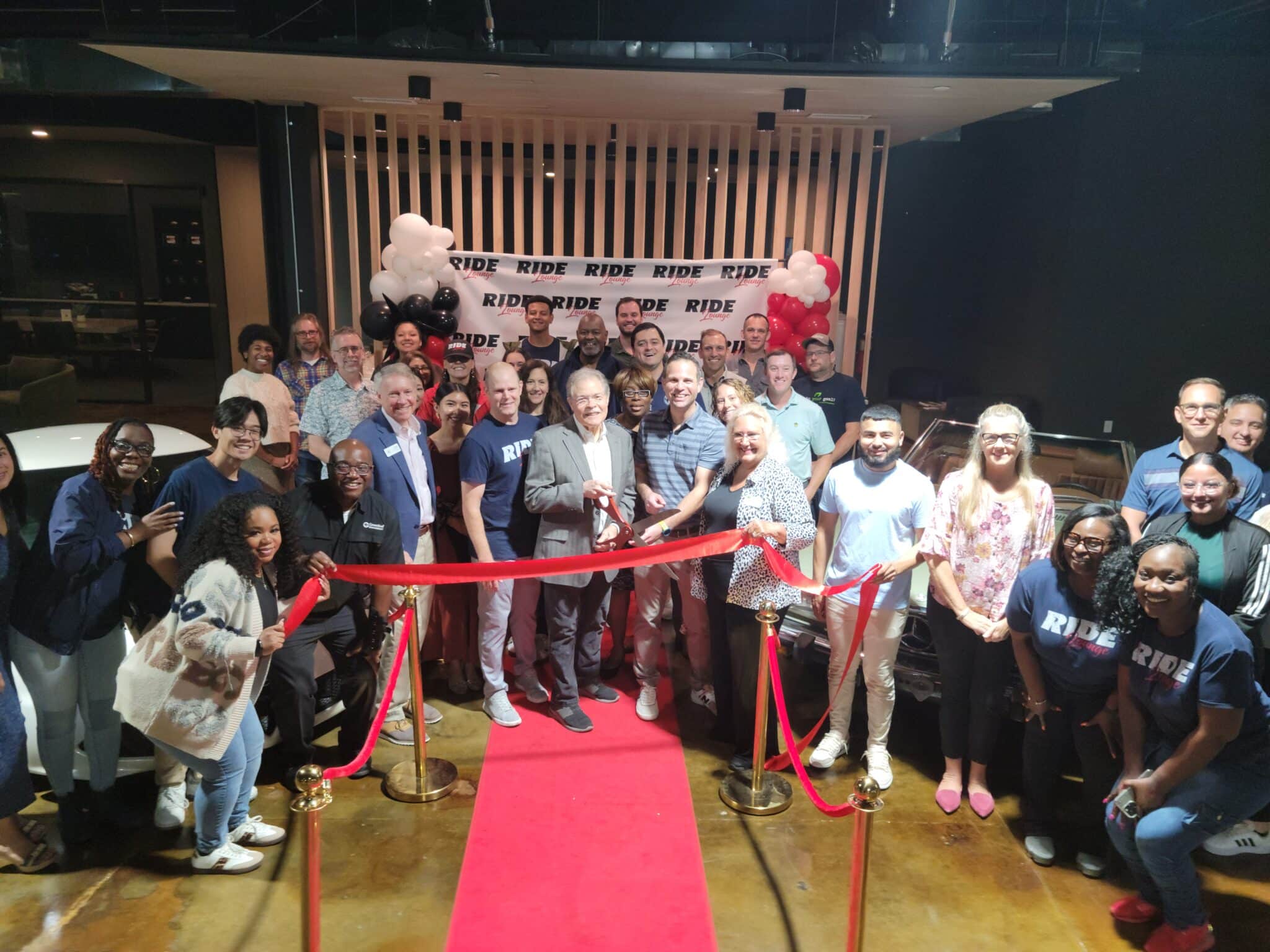
The Peachtree Corners Business Association and the City of Peachtree Corners officially welcomed Ride Lounge, one of the city’s newest businesses, with a morning ribbon cutting ceremony on May 29.
From 9 a.m. to 10:30 a.m., members of the city and PCBA, along with members of the community, enjoyed mingling, getting to know the Ride Lounge staff and learning more about the unique company.
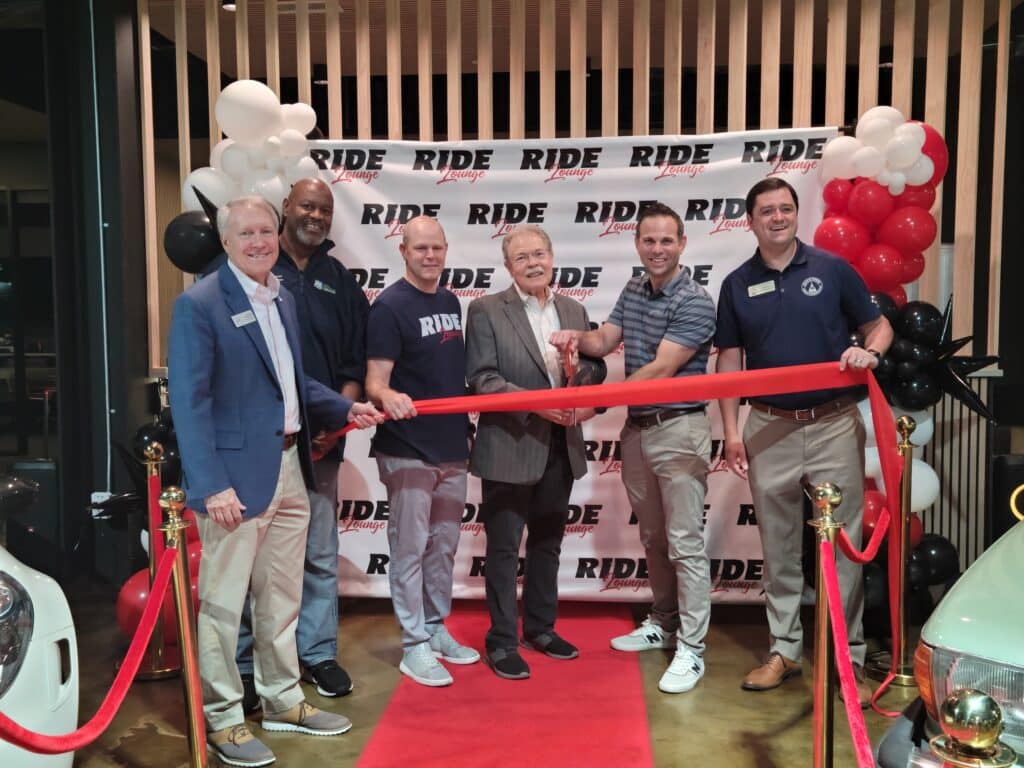
Guests also enjoyed a light breakfast spread of bagels, fresh fruit, coffee and juice and brief speeches from featured guests.
Welcoming the business
Lisa Procter from the PCBA spoke first and thanked Ride Lounge for being part of the PCBA and the Peachtree Corners community. She also recognized the collaboration between the organization and Ride Lounge in hosting the ribbon cutting.
“The PCBA was proud to coordinate with Ride Lounge and the community to make this event a success,” Procter shared.
Mayor Mike Mason followed Procter in addressing the crowd and talked about the state of business in Peachtree Corners and how companies like Ride Lounge help make the city a great place to live and work.
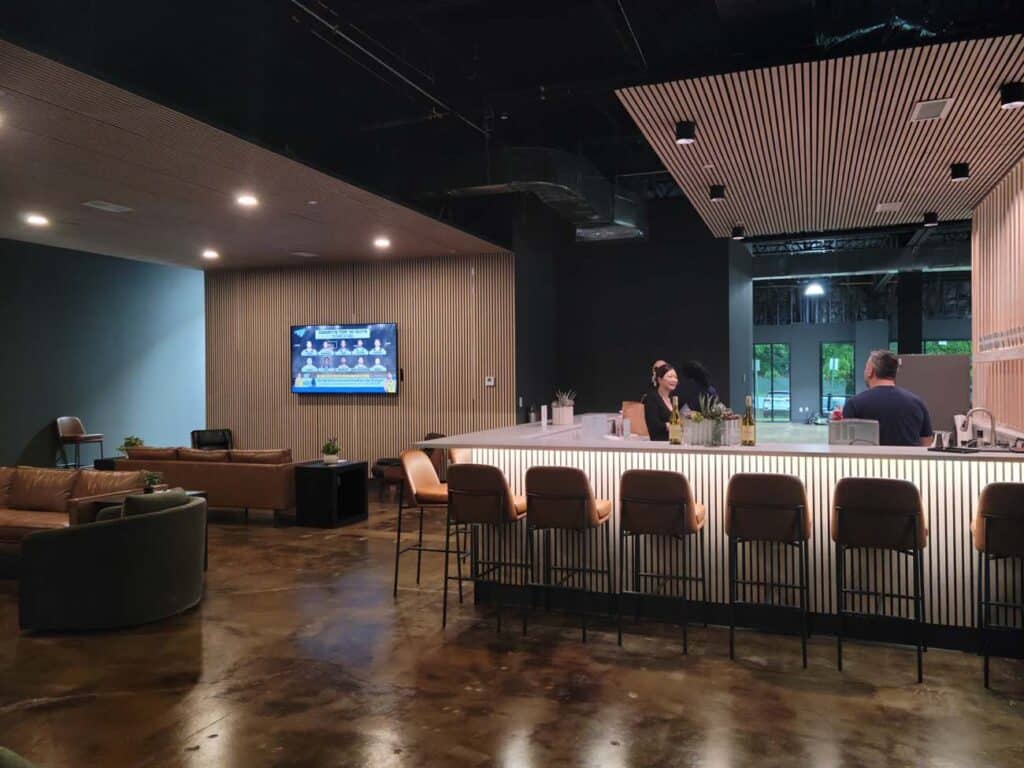
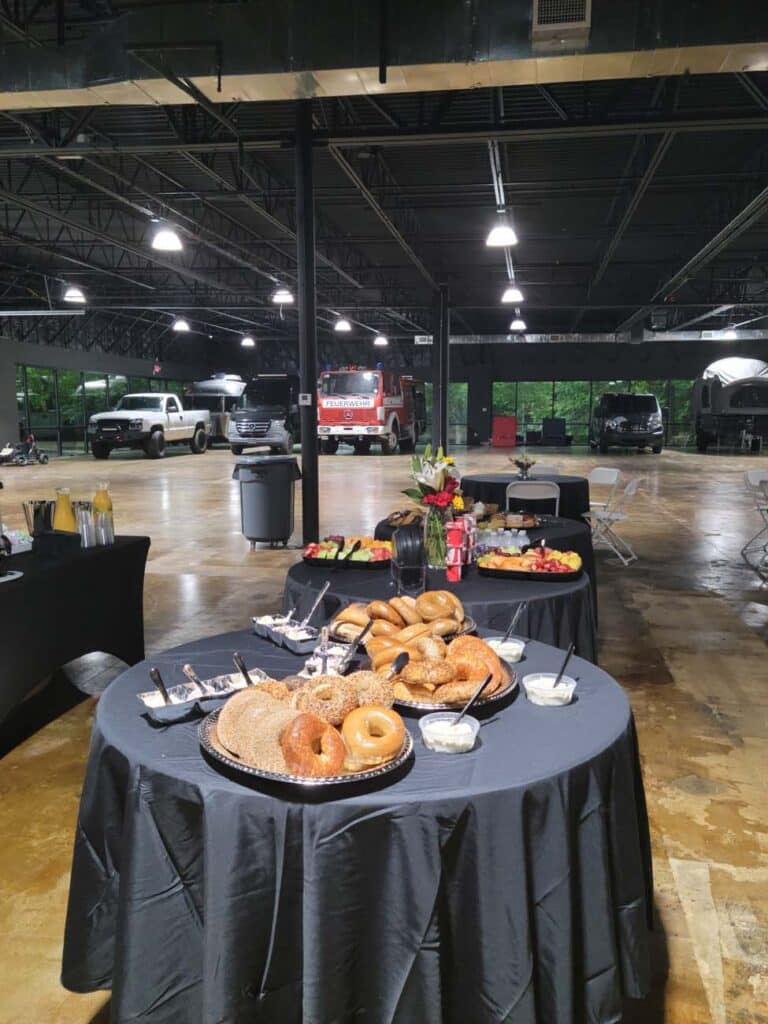
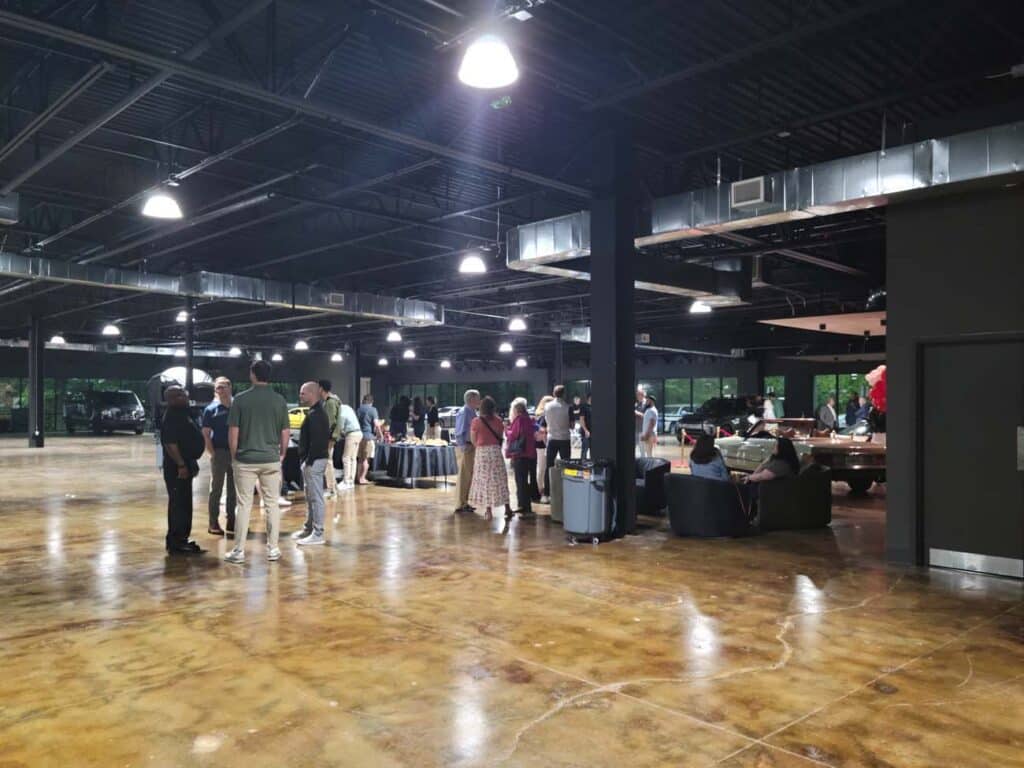

Dave Codrea and Josh Friedensohn, founders of Ride Lounge, then thanked everyone for coming and shared a little about the company and their vision.
The cutting of the ribbon and photos followed the brief speeches. Afterwards, the crowd was invited to tour the space and spend more time chatting and networking.
About Ride Lounge
The Ride Lounge is more than a car storage facility, it’s a place that celebrates car culture; where car enthusiasts can meet to discuss their passion and show off their vehicles.
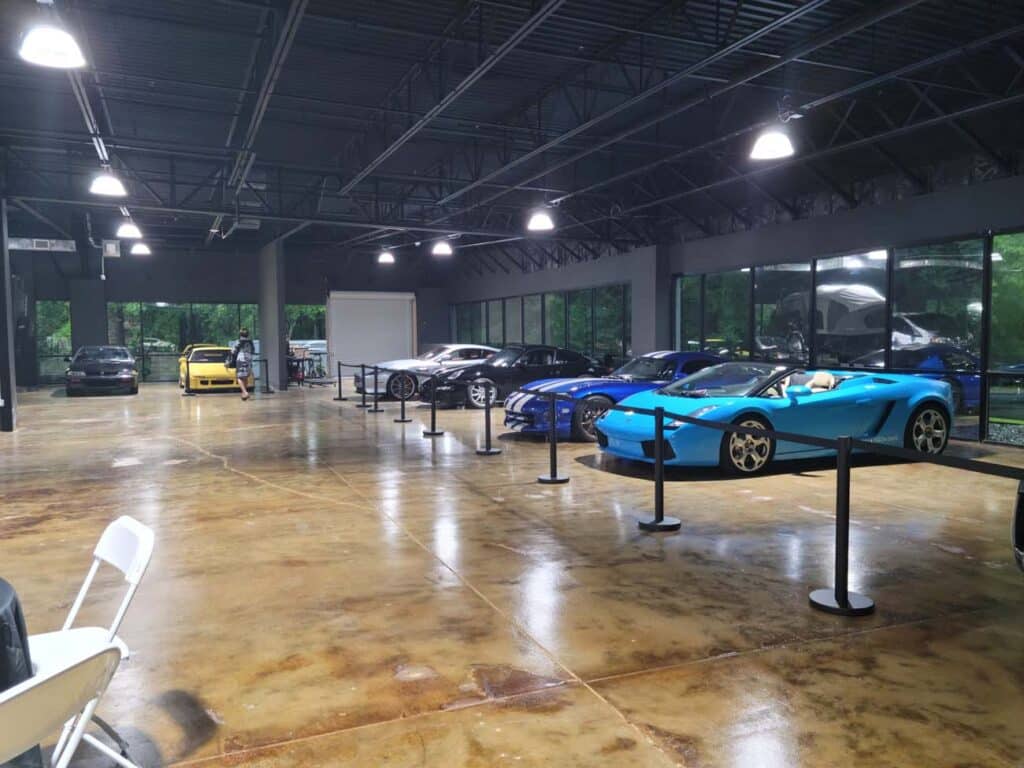
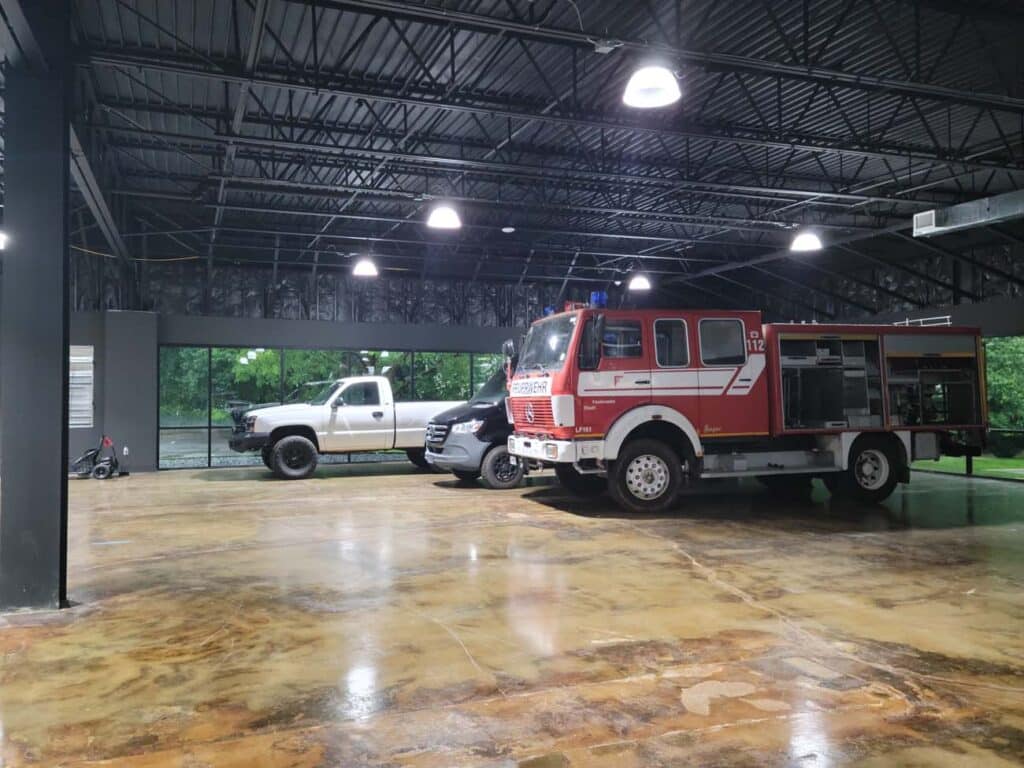
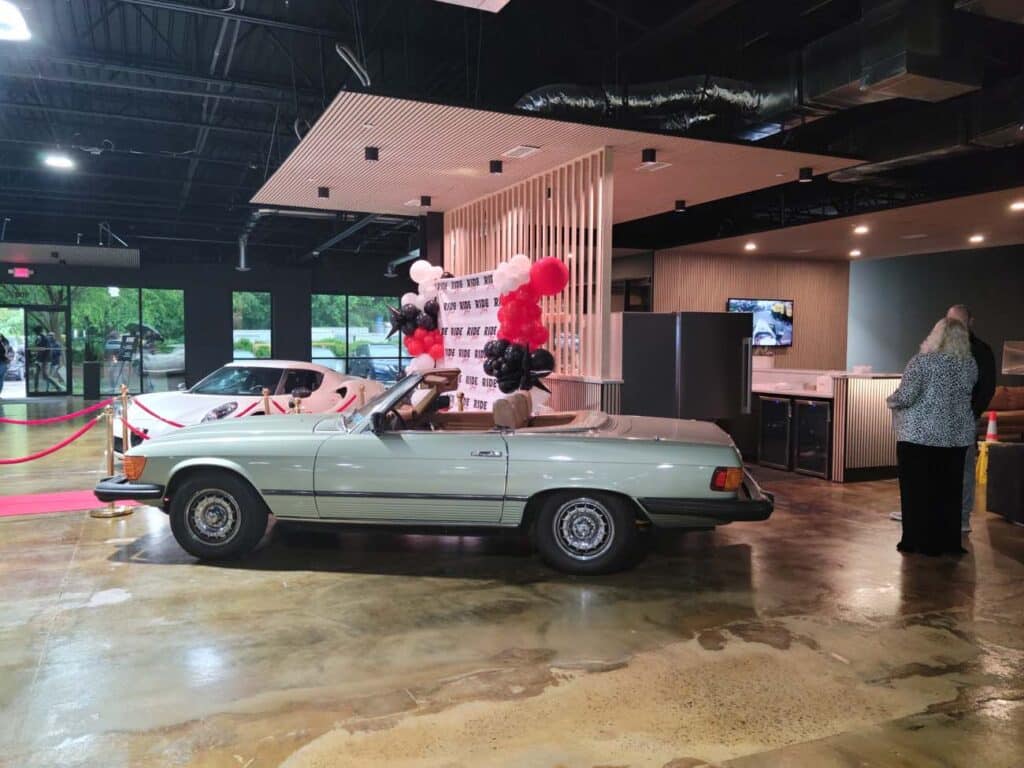
Founders Dave and Josh wanted to create a welcoming community that people would trust to store their vehicles, but that would also offer a club-like atmosphere and host fun, car-centered events that the whole family could enjoy.
Ride Lounge’s 20,300-square-foot facility is comprised of 58 parking spaces with the potential to include car lifts in certain areas. There are cozy seating areas, a meeting space and kitchen area so members can hang out, relax and talk cars.

Designed for cars that are driven and enjoyed by families, Ride Lounge has room to hold up to 400 people for special events and activities.
To learn more about Ride Lounge, visit ride-lounge.com.
For more about the PCBA, visit peachtreecornersba.com.
Related
Business
Music Matters Productions Expands Peachtree Corners Headquarters
Published
3 weeks agoon
May 21, 2025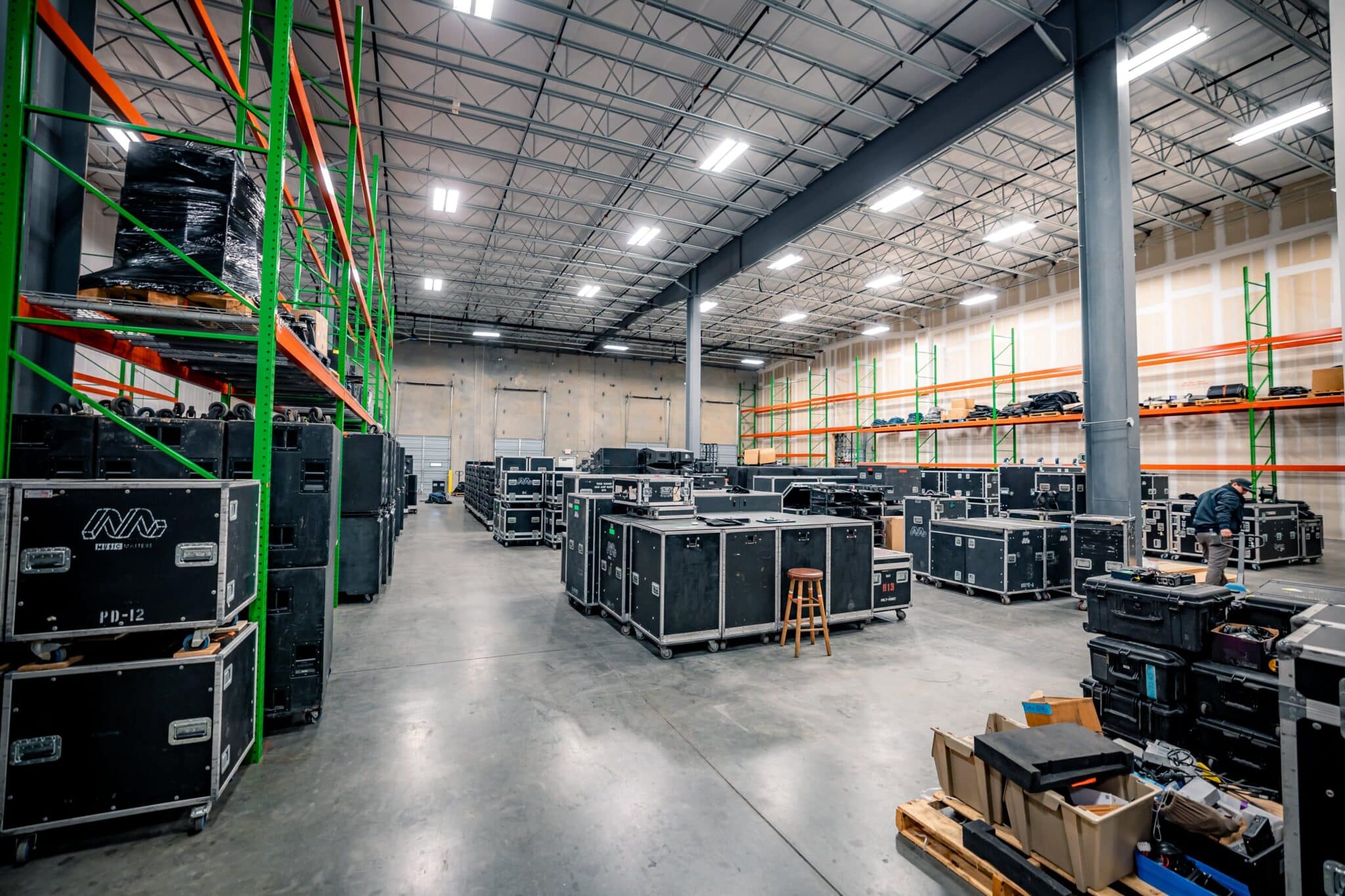
Company adds 20,000 square feet to meet growing demand
Music Matters Productions (MMP), a premier provider of audio, lighting, video, staging and rigging solutions, has expanded its metro Atlanta headquarters, increasing the total warehouse footprint from 40,000 to 60,000 square feet.
In addition, MMP has opened a second 10,000-square-foot building directly across the street to house its growing corporate production division.
The expansion comes in response to increased demand across touring, festival and corporate markets, as well as the continued growth of MMP’s high-end gear inventory. With a fully dedicated shop for each department, including audio, lighting, video, rigging and staging, the new layout provides more space for show prep, pre-rigging and crew coordination, allowing for even more efficient load-ins and streamlined execution.
New features
The rigging department now features a new mobile motor hoist test stand, allowing for in-house motor certification, a service that’s now available to external clients in the production community.
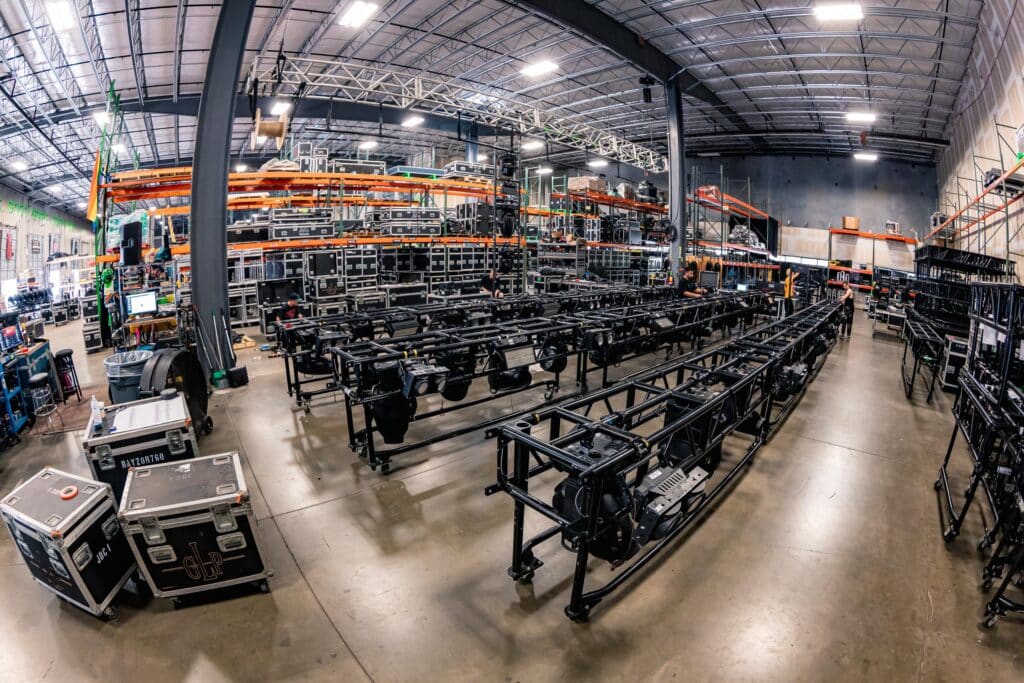
Five new truck bays were added in the process, as well, bringing the total number of bays to 17 — an important upgrade for MMP’s fleet and the increasing number of shows moving through the warehouse each week.
“This growth is a direct reflection of the work our team puts in and the trust our clients place in us,” said Aaron Soriero, owner of Music Matters Productions. “We didn’t expand for the sake of being bigger, we expanded because we needed the space to do the job right. More room means tighter prep, faster turns and better support for our clients.”
Expanding operations
The expanded warehouse and building across the street include additional offices, mixed-use areas and a dedicated repairs department, giving the team more capacity to prep, collaborate, QC and scale for increasingly complex events — both corporate and entertainment.
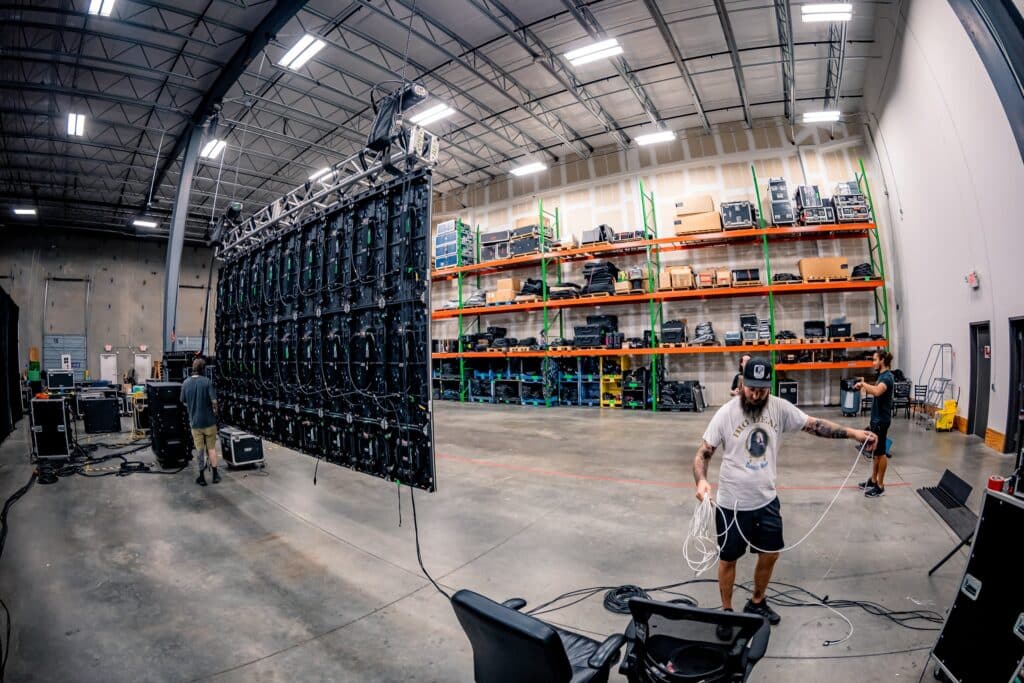
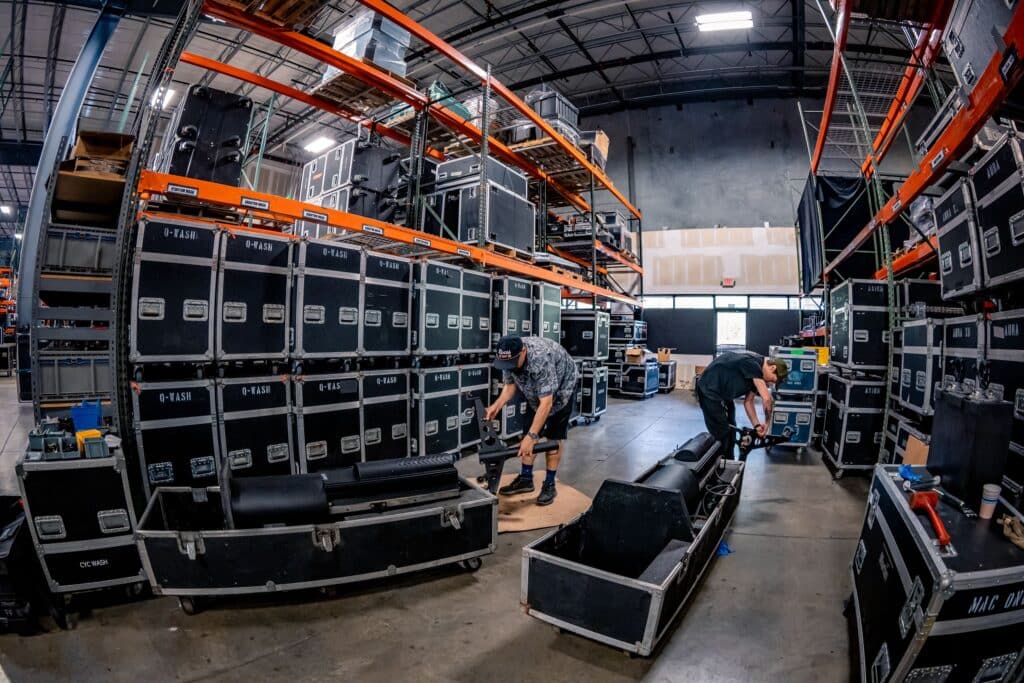
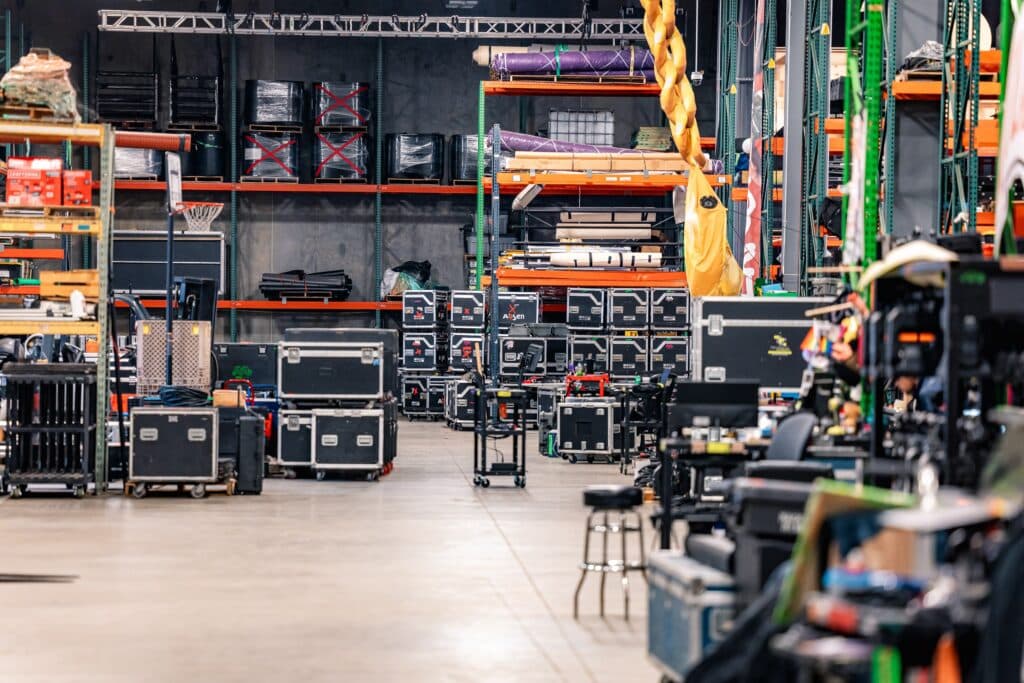
With a reputation built on reliable gear, experienced crews and an enhanced client experience, MMP continues to solidify its role as a go-to production partner for events of every size and setting — whether it’s a beachside festival, a stadium tour, brand activation or a high-stakes corporate show.
About Music Matters Productions
Music Matters Productions is a full-service live event production company based in Peachtree Corners, Georgia, providing industry-leading audio, lighting, video, rigging and staging solutions for tours, festivals, brand activations and corporate events across the country.
Known for its high-end inventory, seasoned crew and deep dedication to doing the job right, MMP supports hundreds of productions each year and is trusted by clients nationwide.
For more information, visit mmp-atl.com.
Related
Business
From Boardrooms to the Himalayas: Vandana’s Journey to Purpose and Growing with Intention [Podcast]
Published
3 weeks agoon
May 19, 2025
How one family blends operational clarity, conscious leadership, and community-driven values to grow their business — together.
In this episode of UrbanEbb, host Rico Figliolini chats with Vandana Aggarwal, VP of Operations at Aggarwal Real Estate, about the winding road from global consulting to family-run commercial real estate in Norcross, Georgia. With honesty, warmth and insight, V shares how she went from working 80-hour weeks in corporate strategy to rediscovering clarity in the mountains of India — ultimately helping transform her family’s business into a community-driven real estate firm managing over 50 shopping centers.
The conversation weaves together themes of leadership, legacy, operational excellence and the transformative power of both AI and yoga. It’s a story about clarity, courage and conscious growth — both in business and in life. This is another episode you won’t want to miss.
Episode Highlights
- Why Vandana left a high-powered consulting career to join her family business
- How hiking Kilimanjaro and studying yoga in the Himalayas changed her leadership mindset
- The operational overhaul she brought to Aggarwal Real Estate to support growth
- What it’s like working side-by-side with your dad, siblings, and 700+ tenants
- How the company rebranded with intention and built a mission around “building communities as a community”
- Where AI is reshaping real estate—from lease drafting to property management—and where it still can’t compete with people
- Leadership succession planning with siblings at the helm
- The importance of clarity, calm, and conscious growth in both business and life



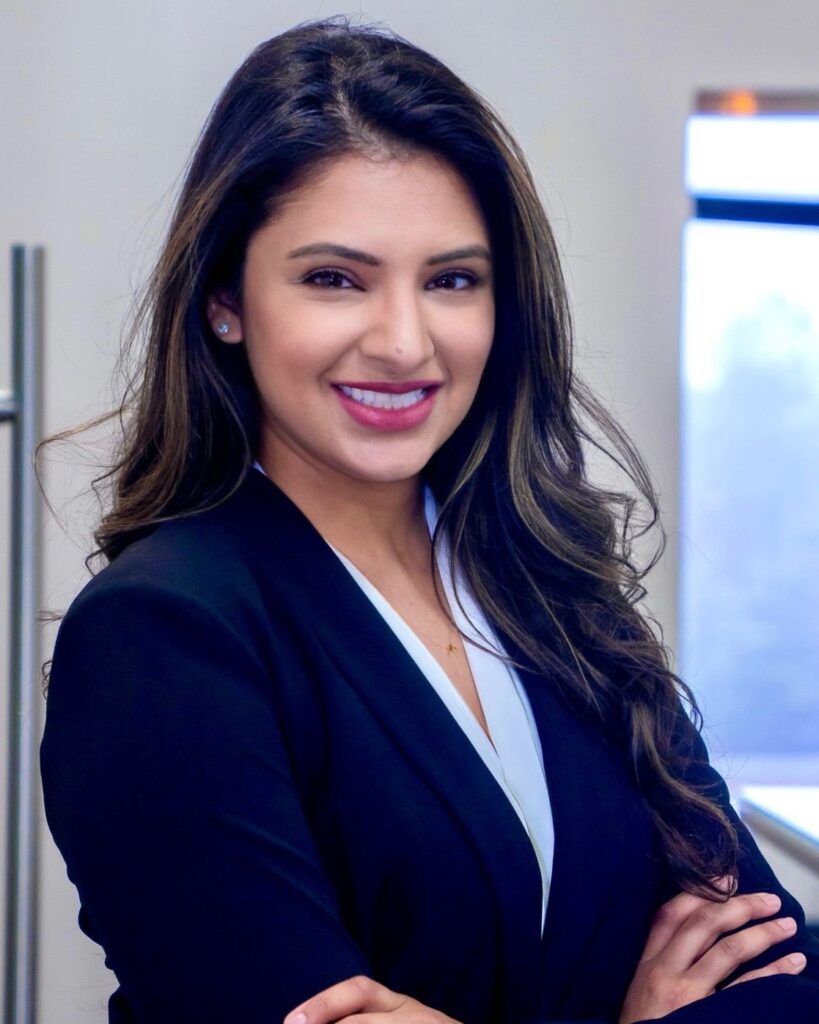




About Vandana Aggarwal
Vandana Aggarwal is the Vice President of Operations at Aggarwal Real Estate, her family’s commercial real estate investment and management firm. She brings a unique blend of strategic insight and operational excellence, shaped by her early career as a consultant at A.T. Kearney, where she advised Fortune 100 to 500 companies. A graduate of Georgia Tech, she also took a transformative detour from the corporate world to spend a year in India teaching yoga—an experience that continues to influence her leadership style today. At the core of her work is a deep commitment to family and a passion for building strong, connected communities.
Timestamp:
00:00:00 – Introduction and sponsors: Vox Pop Uli & EV Remodeling
00:03:12 – From Georgia Tech to global consulting
00:04:23 – Leading strategy for Fortune 500 companies
00:06:11 – The role of vision alignment at the C-suite
00:08:01 – Sabbatical becomes family business overhaul
00:09:35 – Bringing operational excellence to a growing real estate firm
00:12:02 – A year of yoga, nature, and healing in India
00:17:03 – Hiking Kilimanjaro, testing limits, and expanding self-trust
00:18:52 – Navigating family dynamics inside a business
00:21:56 – Planning for leadership transition: siblings, strategy, succession
00:24:06 – Rebranding the business: from American Management to Aggarwal Real Estate
00:26:33 – Where AI fits (and doesn’t) in real estate operations
00:30:04 – Legal, leasing, HR, and marketing efficiency with tech
00:31:01 – Community-focused retail and experiential shopping centers
00:32:00 – Reflections on AI, journalism, and digital trust
00:32:57 – Closing thoughts
Podcast Transcript
00:00:00 – Rico Figliolini
Hi, everyone. This is Rico Figliolini, host of UrbanEbb. This podcast comes out of the city of Peachtree Corners, and we have a special guest today. And if I don’t mess up the name, it’s Vandana Aggarwal.
00:00:15 – Vandana Aggarwal
Absolutely. You can call me V, Rico.
00:00:15 – Rico Figliolini
I’m going to call you V, trust me. And I’m Rico Figliolini, so a bit of a long name there. But V is VP of Operations of Aggarwal Real Estate here, based in Peachtree Corners? No, Norcross.
00:00:30 – Vandana Aggarwal
In Norcross, yeah. Norcross, Georgia.
00:00:32 – Rico Figliolini
Yeah, yeah. Just off 85, and?
00:00:34 – Vandana Aggarwal
Jimmy Carter.
00:00:35 – Rico Figliolini
And Jimmy Carter.
00:00:36 – Vandana Aggarwal
We’re completing each other’s sentences already.
00:00:39 – Rico Figliolini
But where are we doing this? We’re doing this from one of our great sponsors, one of our two great sponsors, Vox Pop Uli. Was this tastefully obnoxious? Let me tell you, I asked them to do a corner cut for us, and this is perfect. So they have the Moxie logo and stuff. So they’re branding, right? Same way they can brand your stuff. They’ll put your logo on anything. They’ve done, I think, 6,000 vehicle wraps. They’ve done garments, obviously. They could do one-offs or they could do 1,000. They do trade show booths, wraps, everything. So anything you need a logo on, think of what object you want it on. They’ll figure it out for you. And if you’re doing, let’s say, 5,000 mailers and you want that database customized for each postcard, they could do that also. It’s called data. I forget what it’s called, but they can do that. They can work the data into the printing as well. So all customizable. Check them out, voxpopuli.com. Now, getting to something we were talking about, hands-on stuff, which is this also. This can’t just be done by machines, right? Although machines, you still need people. But EV Remodeling Inc., they are a remodeling company. They can do design to build. They can do whole house renovation. They can create your deck, your backyard gazebo. They can put a bathroom, kitchen, anything you want. EV Remodeling Inc. is owned by Eli and his family. Lives in Peachtree Corners. It’s based out of our city. They’ve done, I think, over 250 homes recently. So check them out, evremodelinginc.com. And I want to thank both of them for being great sponsors of ours. So, it’s always a long stretch doing that, but I’m glad to have you, V.
00:02:22 – Vandana Aggarwal
I’m happy to be here. Thank you for inviting me onto your podcast. Excited to chat with you.
00:02:25 – Rico Figliolini
Yeah, no, this is cool. Well, you know, I met you, where did I meet you at? I think it was the chamber.
00:02:30 – Vandana Aggarwal
Yeah, the Southwest Gwinnett Chamber event.
00:02:32 – Rico Figliolini
Yeah, and we were talking a bit, and I was like, damn, you know, I had my father owned a business, and he wanted his kids to be in it. None of us, none of us could go into that business. It’s a little difficult, different industry. It was a hard industry, plus my father was very patriarchal, very over-demanding. God bless him. He mellowed in age. But when you were telling me about your family, I mean, your father, your mother, your sister, your brother, and you, I mean, all in it. It’s amazing.
00:02:55 – Vandana Aggarwal
We’re all together. We’re the modern-day Brady Bunch.
00:03:03 – Rico Figliolini
I love it. Yes, that’s exactly it. But, let’s start a little bit. I mean, you were telling me, I mean, you came from a consulting world. You came where you were actually being paid a lot more than you’re being paid right now, actually.
00:03:12 – Vandana Aggarwal
I told my father he couldn’t afford me when he recruited me out. So I graduated from Georgia Tech in 2007. I actually did join his company right out of college for two years, learned a lot about the company. He actually had me go through a rotation in every department of the company to learn more about what we did, how we operated. And I think very quickly, it was also 2008-9 with a recession. But I was also very interested to learn how big companies operate. How can you take a small company at that time? We were much smaller than we are today and really understand how do you go from this, which is where everyone starts, right? As a new company to get to be one of the largest in the nation, in the world and see how they operate, how they grew it from, you know, a mom and pop business to this global enterprise. Consulting was a natural transition to learn about multiple companies, multiple industries. So transitioned into AT Kearney, which has now been rebranded as Kearney, and out of their Chicago office. So I was there for seven to eight years, almost eight years.
00:04:23 – Rico Figliolini
Entry-level position you got in?
00:04:24 – Vandana Aggarwal
Yeah, I went in as an analyst. The good thing with that experience was by the time I left, I was a senior manager with Kearney. I worked across 17 different companies in those eight years. So I got to experience how CPG companies, retail companies, transportation, IT, you name it, I’ve done it. In terms of the different types of industries I got to work with, worked with a lot of Fortune 100 to 500 companies at the C-suite level. So we were coming up with all kinds of strategy projects such as new market entries, mergers and acquisitions. A lot of what I ended up specializing in in those seven years was operational efficiency and growth strategy. So it was an amazing, I’m grateful for that learning experience, the you know the caliber of minds that you work with. You also get to experience what the C-suite looks like. How does the very top operate and then it goes from the top down right? So it is very much led at this very top leadership and you see how companies change in their culture the way they operate based on how the top is designed.
00:05:38 – Rico Figliolini
So did you see good and bad at the top?
00:05:41 – Vandana Aggarwal
Absolutely. And I’m not going to name names. But you learn a lot when you see how your CEO and your C-suite right below them, the culture they’re bringing into a company and their vision and their goals if they’re aligned, unaligned. Anyone that at the very top have different viewpoints of where the company has had it is where companies start to break apart, lose revenue, lose their you know people, which is very important.
00:06:11 – Rico Figliolini
Where did you see the pain point then? What was the common denominator I guess of those?
00:06:18 – Vandana Aggarwal
There’s no one common denominator, but if I had to kind of narrow in, it comes down to what is our five-year, ten-year trajectory? Where are we headed? As large companies grow, you’re not just in one industry. You’re not just doing retail shopping centers. You’re investing in all kinds of properties just to bring it back to our company. Similarly, a CPG company can make all kinds of products, so they have to decide what it is because you have to be concentrated on the right places. If you have a leadership team that is in alignment of what that ultimate goal is, right, then you have clear strategies and, you know, metrics you’re measuring your success against. So that was a big thing that I learned. Also just, you know, seeing how great leaders operate, right? Some of the best in the nation today, I got to be in the room with them and just to see how they lead is very important.
00:07:14 – Rico Figliolini
Did you see any family dynamics in any of those businesses?
00:07:20 – Vandana Aggarwal
No. You know, there may have been like a father-son duo, but when you’re looking at the very top, I won’t say it was like all in the family, right? You know, and it also becomes the size of a company, right? You know, when you get to an international scale, you’re not always blessed that every person in your family has the right skill set and experience to fill each role on that C-suite.
00:07:46 – Rico Figliolini
I’m just thinking Trump for some reason. Every kid has a job.
00:07:51 – Vandana Aggarwal
Every kid has a job.
00:07:52 – Vandana Aggarwal
You had the accent, right?
00:07:54 – Rico Figliolini
Pretty much, I guess. So after the C-suite or expansion, you traveled a lot too, I think, right?
00:08:01 – Vandana Aggarwal
I did, yeah. So after my seven, eight years in consulting, I was reaching 30. And Shiv, my father, came to me and he said, you know, you’re doing this for a lot of outside companies. Why don’t you help us grow and bring your expertise home? And I said, look, I’ll take a sabbatical. Let me assess the company. And after that period where I took a short sabbatical to come look at how we were operating, I said, I can give you three years. I said, you can’t afford me, but I’ll give you three years of my time. And I said, I think it’ll be the right, it was the right time in the company. We were investing very heavily. We were bringing in a lot of new square footage into the company, and we weren’t designed to manage it. So we as a company, as you know, we are the investors. We have an in-house management company, an in-house leasing company. So as we acquire new properties, our team does the management for those properties in-house. We don’t provide third-party services today. And we do the leasing in-house. But at that time, when he, you know Shiv started we had one or two and now we’re at 50 shopping centers plus and other investments that we have. And there’s a very different way you operate you know and how do you how does the CEO go from being an operator to where he’s overseeing it, but he’s not into the weeds right? So he has create a system for that to happen right? You have to have standard operating processes for your property managers, your accounting team, your marketing team.
00:09:35 – Rico Figliolini
And you quite didn’t have that before.
00:09:37 – Vandana Aggarwal
We didn’t, no. And, you know, and I think that’s why he wanted to bring me in is because my strength is operations and I love it. I love going into messy places and cleaning them up.
00:09:49 – Rico Figliolini
Is that what you did when you were a consultant?
00:09:51 – Vandana Aggarwal
A lot of what I was concentrating on at the end of my consulting career, yes. So I did a lot of operational efficiency work. So we’d go in, assess the way companies were designed. And we’d interview hundreds of team members to understand what their role is. You know, what are they responsible for? How are they delivering? What are they measuring for success? And then we’d redesign the way they did that based on, again, bottom line, what are your ultimate goals for the company?
00:10:21 – Rico Figliolini
So you had to understand that before you got to that point. And you’re not making the decisions, the C-level.
00:10:29 – Vandana Aggarwal
Present, right? And similarly even with Shiv, when I first joined, I said, look, this is how I think we need to redesign the company from a bottoms-up perspective based on ultimately our goal of growth, doubling, tripling in size over the next ten years. And I think this is where the father dynamic came in. I guess he trusted me. And he said, do it. He just said, do it. And it was beautiful because right when you’re with large companies, it’s a lot of time before you get. Those decisions made and that trust, right? And so it was great. And he said, yeah, just put it into place.
00:11:07 – Rico Figliolini
See, that’s a great dad, actually. Some dads would be like, I don’t know about that daughter or son or whatever.
00:11:16 – Vandana Aggarwal
It did take time, though, like to ultimately, he was in the operation so heavily. And, you know, until today, I’m still like, step up, step up. Like, I need you to not get into the weeds. Like I think at that time we had tenants calling him, maintenance guys calling him. Like every little and big problem would go through his cell phone. I said, you’re too smart and you’re such a good investor. This is not your skill set. You shouldn’t be managing this. You need to bring people on who are expertise in this area. And I said, you need to be focused on like the larger plan.
00:11:51 – Rico Figliolini
This way you can grow it better.
00:11:51 – Vandana Aggarwal
Which I think has been very successful over the last eight years I’ve been with him now.
00:11:57 – Rico Figliolini
So before you got to him, though, you were traveling a bit internationally as well?
00:12:02 – Vandana Aggarwal
Yeah, yeah. So this is an amazing year. I was very burnt out. By the time I left consulting, I was working 70 to 80-hour weeks, traveling Monday through Thursday, if not more than that, of the week. So I told Shiv, I was like, I’m going to take a month. I’m going to go to India, get my yoga certification. No intention to teach at the time. I just said it’d be a great one-month retreat. And I was up in the mountains like Himalayas and India in a city called Dharamshala. Beautiful place. One of my favorites in the world. And I just, I think I needed it for myself emotionally, mentally to take that break. So I turned one month into one year. I didn’t know it was going to be a year.
00:12:49 – Rico Figliolini
In that same city? In that same town?
00:12:50 – Vandana Aggarwal
Yeah, so I ended up the school that I had gotten my certification with. I asked them, I was like, do you mind if I hang around for a little while? Like very casually, I’m like, you know, I’ll pay for my room and board, but I just want to be around this group and this energy. And they said, well, if you’re going to be here, why don’t you intern? And they’re like, room and board is free if you intern. I was like, sure. You know, not thinking what it was leading to. This is like that beauty of the universe coming into play. Yeah, so I started teaching, ended up loving teaching. So then I ended up teaching the 200-hour yoga training course. And I was in Dharamshala for four months. And then I moved down to Goa, their Goa campus for another six.
00:13:30 – Rico Figliolini
Where is that? Goa?
00:13:32 – Vandana Aggarwal
Goa? It’s in southern India on their west coast. It’s a beach town. Yeah. So I had the mountains and the beach. But I’m a mountain girl. I’m a hiker. But no, it was a beautiful experience. Very different from anything I’ve done with my career, right? But I became a yoga teacher for a year.
00:13:52 – Rico Figliolini
Did that clear your head? Yoga, they say, can do that, right?
00:13:53 – Vandana Aggarwal
Yeah, it’s all the tools of yoga, right? The meditation, the breath work, really getting internal, going in, right? Just going inwards, being quiet, which we don’t have. We have a lot of noise in our life today, you know? And naturally, right? Between family life, work life, social, and then just all of the noise from everything else right? Like we’re sitting here and I can hear the cars right? So you know that difference was when I was sitting there, I could hear the ocean waves and so there’s something very healing in nature naturally. So it was the tools mixed with nature and I still think nature has a very strong healing power on us. So whenever I can, I try to get out on a mountain and by the ocean. But yeah no it was it was a beautiful experience but it did bring a level of calmness into the way I approach things. It changes your perspective of you know at the end everything’s okay. No matter what you’re going through it’s temporary you’re, and everything that’s happening to us is happening to us for the good. We don’t know it, sometimes it seems like a bad situation in the moment, but ultimately you know, universe, God, whatever you believe in is at play to bring you something better in your life. And you just have to step back to understand what is it delivering us.
00:15:19 – Rico Figliolini
I like the way you think. My wife every once in a while would say, aren’t you upset about that? I’m like, I think come tomorrow, it won’t mean anything. There’s no point in, just relax. Not everything, two days later, it’s not as important as it seemed at that moment.
00:15:37 – Vandana Aggarwal
Yeah. And it’s not just that it’s not as important. It’s also like…
00:15:41 – Rico Figliolini
In perspective?
00:15:42 – Vandana Aggarwal
It’s, what am I gaining from this? Like, what can I gain from this? Oftentimes when, you know, a lot of things happen, yeah, like you get hurt or, you know, it’s like in relationships, right? Or if you have a bad business deal, right? It’s like, hey, how am I growing, right? And I think that’s what makes life very exciting, right? Otherwise, if you’re always living on a high, is it a high?
00:16:06 – Rico Figliolini
Yes. So I’m thinking you were a consultant for seven or eight years. 80 hours a week. And all of a sudden you’re doing yoga on the mountains of India. It’s just like, it’s almost like a movie. It’s almost like…
00:16:18 – Vandana Aggarwal
Eat, pray, love?
00:16:19 – Rico Figliolini
Yes.
00:16:20 – Vandana Aggarwal
It was my eat, pray, love moment for a year.
00:16:23 – Rico Figliolini
That’s amazing.
00:16:24 – Vandana Aggarwal
No, you meet amazing people, but I think we were meant to meet everyone that we come in interaction with on a daily basis. You naturally have a connection. There’s a universe at play, and we were meant to cross paths and learn something from each other, gain something from one another, give to the other person. And I think you just have to look at life that way.
00:16:48 – Rico Figliolini
I definitely think along that way. I mean, I definitely think each of us nudges each other in a crowd a little bit. That one nudge can set you off going in a different direction. So I totally believe in that. So you joined your dad. Yes. And you’re, so actually, even before we get there, so yoga, but what other interests have you been?
00:17:03 – Vandana Aggarwal
Yeah. So, I mean, I’m an avid hiker. I’ve done recently in the last few years, I’ve climbed Kilimanjaro. I did the Machu Picchu trail. I’ve done a few 14ers out in Colorado, but I like to test myself physically. You know, just, again, it comes down to how do we find that push within us past our comfort zone? So is this a physical inability or is it a mental constraint? So to get past that mental constraint of discomfort and then really push yourself to the next level and say, I can achieve something. It’s not going to be easy. So to me, if I’m on a hike and it’s not hard, I’m like, well, was it a hike? Like it didn’t test me, but no I think, you know.
00:17:55 – Rico Figliolini
You should do the Appalachian Trail. That’s like 2000 plus miles.
00:18:03 – Vandana Aggarwal
I know. And it is, you know, it’s not just like the hiking part. It is like living out in nature and, you know, sleeping in uncomfortable conditions. Yeah. Walking in the rain. It’s cold. I think the last day of our Kilimanjaro hike, it was negative 20 degrees up in the mountain and my eyelashes were frozen and I couldn’t feel any part of my body. And, you know, and it tested my breathing. And there is that element of push yourself to the point that it’s not your ego anymore. Like if your body’s saying stop, you have to stop as well and respect your body. But yeah, to really test yourself.
00:18:38 – Rico Figliolini
To circle all that back now, you’re back home. You’re working with your father and your family. A lot of businesses grow or die because of family. If it’s a family business, right?
00:18:52 – Vandana Aggarwal
Absolutely, yeah.
00:18:53 – Rico Figliolini
So you have your highs, your lows, your, sometimes you don’t get along. Sometimes decisions are split. People get upset with each other. So you’ve been at your highs and lows physically and mentally doing other things. Has that helped you in some ways? Not that you’re having a bad time with family. Because it sounds like you all fit just fine, like the Brady Bunch.
00:19:15 – Vandana Aggarwal
Let’s keep it that way. No, I mean, there’s multiple dynamics at play. It is a family business. My father is also my boss. My siblings are also my friends and my coworkers. And it’s about no matter how hard you try, you cannot separate those relationships. There is an interplay of all of it when you spend eight to nine hours a day together. But we all have, again, a common goal for the company. And then a common goal for our personal relationship. So when we sit down, we keep in mind that we like each other and we want to keep it that way. Like very simply put, that’s first and foremost for me especially. Even when Shiv had brought me in, he said, oh, can you manage everyone? And I said, I’ll manage everyone but my brother and sister. I said, you know, like I won’t jeopardize the relationship I have with them as a sibling by being their manager. Especially because I said that’s your job like good luck. But not just that it’s you know we all have different skill sets so I said how do I manage my brother who is a genius he’s a CPA by trade you know like I can’t tell him how to run the financials of this company like he’s supposed to teach me that right? And same way I teach him that. My sister has a master’s in marketing right? She is by far the most social, likable person you’re going to meet, and she knows how to work with people. I said, she needs to teach us that. So I think we’re lucky that each of us, and this is, I think, rare, where you have three kids and each one of them has their own skill set. That, I think, helps us stay in business and we see ourselves foreseeably into the long-term future being in business together is because we each bring something very unique to the table. Ultimately we value the relationships that we have on a personal level as a family above all else right? And then you know the element of like, how does the yoga experience a hiking experience teach us. That’s, it’s not specific to anyone’s situation, I think it’s a baseline of who you become right? The foundation. Like it teaches you patience, it teaches you again, everything is temporary so let’s not get overly attached emotionally or get upset or too joyful, even like, let’s just stay neutralized on any situation because it will end. And then the next one will come up and kind of flow with the ebbs and flows of the ocean. You, you flow with everything that comes with you, comes your way at work, at home. But yeah, I mean, we do sit down as a leadership team. I, my father and my siblings and I, and we talk about, hey, we separately do the exercise. Where are we going to be in five years? What role do we play in that journey? And thankfully, all of ours are very similar in what our goals are. And then we have different skill sets that we bring. So even as we design the future of the company in a moment where my father is not at the head of the table, we’re working on that redesign work. But it’s very conscious. It’s very intentional. Again, we all step back and say, hey, look, how do we maintain, how do we solve problems? Because like, you know, we were talking about how tomorrow we may not agree on something, a big decision. What are we investing in? Come back to, you know, right now Shiv gets to make an ultimate decision because he’s the one leader at the top. Tomorrow it’s going to be three people at the top. How do you deal?
00:23:04 – Rico Figliolini
So is there an exit plan for your dad? Well, not an exit plan.
00:23:09 – Vandana Aggarwal
Not an exit plan. He already has. I think he, you know, he’s gone from, he’s the hardest working person I know. I get that from him. We’re addicted to work.
00:23:18 – Rico Figliolini
80 hours a week.
00:23:21 – Vandana Aggarwal
We love working. You know, this company is his baby. I think I’ve adopted it at this point and we all have. But, to stay mentally sharp, to stay alive, you have to keep working. You have to keep doing something. You have to be working towards something that brings you joy and purpose. And I think, you know, he stepped back to take time towards a lot of his nonprofit work, community work that he’s very much engaged with. But he’s still at the top. He’s still running, you know, his, you know, he’s, you know, not slowing down. You know, we’re constantly growing. We’re growing this year in a large scale, which is amazing, and he’s leading that charge.
00:23:59 – Rico Figliolini
How many properties do you own?
00:24:02 – Vandana Aggarwall
Today we have 50 shopping centers and then a few other assets.
00:24:06 – Rico Figliolini
Is that like 3 million square feet or something? 4 million?
00:24:10 – Vandana Aggarwal
Yeah, over 700 tenants. But, you know, when we sat down a few years ago, we rebranded. Aggarwal Real Estate didn’t exist until two years ago. It was American Management Services. And we had a rebranding effort because we said we want the company’s name and the brand to represent who we are.
00:24:33 – Rico Figliolini
I like that, by the way.
00:24:35 – Vandana Aggarwal
Yeah, it needs to mean something. And we were also proud of what our father has achieved, right? He’s given us this beautiful life that we get to help grow upon. So we said it needs to pay homage to him. So we said, let’s make it Aggarwal Real Estate, ARE. And then as we were deciding what that vision is, we’re a family. In the company, we are a family, not just the four of us, but all of our staff, our team. We don’t, you know, we don’t look at them separate from who we are. And so we said our mission as a company is building communities as a community. And it talks about, hey, in all of the real estate work we’re doing, we try to make sure all of our properties are beautiful. Our tenants are happy. They have direct access to each of us in the company. And on top of that, as a company, we are a community within ourselves because we can’t create them until we are one. So it was very intentional to who we already were, but putting it into brand terms.
00:25:37 – Rico Figliolini
It’s amazing. All that property, tenants. Can’t imagine father tech can send text messages on all their problems, if they have any.
00:25:45 – Vandana Aggarwal
He’s a brilliant man.
00:25:45 – Rico Figliolini
You could be too possessed on that stuff. We want to be cognizant of our time together.
00:25:55 – Vandana Aggarwal
Absolutely.
00:25:57 – Rico Figliolini
So the next subject really was going to be about also AI, because everyone’s talking about AI. We were talking about that before the show started, before we started recording, which was kind of funny because V was asking me if we edit anything. And I was like, no, straight through.
00:26:11 – Vandana Aggarwal
I wanted to see if I could say a few things and then have it taken out of this conversation.
00:26:13 – Rico Figliolini
Nope. Nope. Doesn’t work that way. So, but ChatGPT, AI, that’s all. I mean, you know, could I create a bot to edit this? Probably. But there’s so many things we use in our lives. And you’ve been talking about how it would affect your business. Nevermind the consulting work you did.
00:26:33 – Vandana Aggarwal
Yeah. I mean, the consulting world is, I mean, it depends on the industry, the type of work you’re doing. In real estate, I’ve put a lot of thought behind this. There’s a lot of conversations happening across every industry, every sector, whether it’s education, automotives, real estate, et cetera. Everything’s being discussed. How is that changing the future? How do we incorporate it to be more efficient, right? Be the best in the industry that we can be or operate better. And so for me it’s again comes down to that operations element that I think about like, how do I incorporate it for a company that’s a medium-sized real estate firm today as we become a large company, a bigger player in the market. And people are very important in real estate right?
00:27:17 – Rico Figliolini
Talk about editing?
00:27:20 – Vandana Aggarwal
I was telling you, we should bring them into the podcast.
00:27:27 – Rico Figliolini
We’re going to run a little longer on this.
00:27:36 – Vandana Aggarwal
But let’s take retail shopping centers. This is brick and mortar. I did a paper actually for a large mall retailer back in my consulting days on how the title of the paper was, is brick and mortar dead? And, you know, full circle, I am fully dedicated to brick and mortar, retail, office, multifamily now. But you still need people to clean up your properties, fix your maintenance issues. We were talking about roofing, plumbing, electrical. That is hands-on work. You know, today there is, it’s going to be a long time before there’s a robot that comes in to do that. There will be. I don’t know. I do not see that in 10 years to say we’ve got roofers that are robotic drones that are going to come fix my roof problems.
00:28:24 – Rico Figliolini
Zumbas, they’re going to run around the roof or something.
00:28:26 – Vandana Aggarwal
That’s actually genius. A Zumba for my roof.
00:28:31 – Rico Figliolini
Why not? Attach it to the right thing.
00:28:33 – Vandana Aggarwal
But so those are very people-oriented roles today. Technology will advance how quickly it’s done or how well it’s done. But you’ll still need someone to operate the machinery of it and everything.
00:28:49 – Rico Figliolini
Just not as many.
00:28:50 – Vandana Aggarwal
Yeah. Construction, similarly, right?
00:28:54 – Rico Figliolini
Unless you 3D print a house. I’m sorry.
00:28:56 – Vandana Aggarwal
No, it’s true. It’s true. There’s so many options. I’m thinking 10 years now. I’m not going to have a 3D printer making the metal framing for my new construction project. You know, or installing the sheetrock, it does probably speed up the process, right? There will be machinery to help with that, a lot of AI development in that way. It’s a lot at an office administrative level, right? The speed in which you’re processing invoices, the speed in which you are, you know, getting payments taken in. Today, I would say as far back as right before COVID, we were still accepting checks for money. Now it’s all online. Like we do not accept money coming into the office, or it’s very limited to what we do, right? So that’s AI, if you think about it, right? The ability to pay online.
00:29:42 – Rico Figliolini
QuickBooks Online uses AI now, you can enable it.
00:29:47 – Vandana Aggarwal
So we’ve been using it for many years. The advancement of it has been a little bit slower, and now it’s sped up. Marketing, we were just talking about how you created a flyer on ChatGPT, was it?
00:30:00 – Rico Figliolini
I won’t talk about the student that’s helping us out here and how they use AI.
00:30:04 – Vandana Aggarwal
No, AI in school, right? But yeah, it’s an AI processor for my HR roles, right? Instead of reading 100 resumes, it’s going through the system to filter them out. Whether it’s writing contracts, I won’t lie. Legal jargon is coming out of ChatGPT today. And so it’s speeding up the way we’re doing work. But my legal team probably, and they won’t say it, should be using AI if they’re not. To help create some of this work right? So it’s like these companies are still going to be needed, but the way that they’re able to respond to us at a quicker, everything would just happen faster right? From typewriters to computers, everything.
00:30:49 – Rico Figliolini
Especially if they know that they just did a lease from you for this property in Texas, that we need three more leases done for three other places, it’s not going to be that much different, right? It’s a template.
00:31:01 – Vandana Aggarwal
It’s coming out a lot faster. Yeah, I mean the negotiations, that’s a people-to-people thing right? So I think thankfully in the real estate world we’re still going to need people. We’re still going to need buildings right? The way built, we were just talking about how a retail shopping center is no longer just for shopping. It has to be for entertainment. It has to be for bringing families in and giving them more than just, hey, go into a TJ Maxx and buy something, right? It’s like, what else are you getting when you’re at that center? Whether it’s a play space or events, we’re starting to do more events at our shopping centers. So it’s, again, serving the community.
00:31:39 – Rico Figliolini
We’re seeing that more. More of that happening. We could go on and on here.
00:31:46 – Vandana Aggarwal
Chatting with you.
00:31:46 – Rico Figliolini
Yeah, and we should probably do one on either AI in the marketplace. Or maybe a panel discussion on something similar.
00:31:51 – Vandana Aggarwal
Yeah, overall, yeah. That would be exciting.
00:31:55 – Rico Figliolini
Yeah, I think that would be cool.
00:31:56 – Vandana Aggarwal
I think it’s interesting to learn about kind of where every industry is heading. It impacts all of us.
00:32:00 – Rico Figliolini
For sure. I mean, the magazine business, I mean, it’s all like we have certain, we have AI rules. But, you know, AI is still being used to degree to research things. And to do certain things like that. You know, hopefully journalism isn’t just handed over. They do say 40% of the internet is AI written. So, which is kind of incestuous almost because it’ll just feed on itself at some point.
00:32:27 – Vandana Aggarwal
There’s a whole discussion about the validity and the trust behind digital content. In the next few years. I think it’s going to diminish.
00:32:35 – Rico Figliolini
Oh, yeah. I mean, I’m seeing videos now and it’s just like, it just looks so real. And you could not tell the difference, even voice-wise.
00:32:42 – Vandana Aggarwal
And that’s scary to think. It’s like, how do you trust what you see?
00:32:47 – Rico Figliolini
So on that note, and since this is not edited, so this is right from the beginning. So this is all true. But I want to thank everyone. I want to thank you, V, for being with me.
00:32:57 – Vandana Aggarwal
Thank you so much for having me. This was a great conversation.
00:33:01 – Rico Figliolini
It went by way faster than some of these go. So this is a great discussion. Thank you, everyone. I appreciate you for joining us. Thank you for Vox Pop Uli for the studio look and for letting us do it here, for being a sponsor and for EV Remodeling. Also, I want to thank Jeremy Pruitt behind the camera who has taken care. He’s a Paul Duke student. And it wasn’t him that I was talking about before, by the way. But all the work he’s done on the back end on this. So thank you, Jeremy. So thank you all. Thanks for being with us.
Related
Read the Digital Edition
Subscribe
Keep Up With Peachtree Corners News
Join our mailing list to receive the latest news and updates from our team.
You have Successfully Subscribed!

Vox-Pop-Uli Launches RED Initiative for Veterans’ Support

From Zero to Accredited: Dunwoody’s Billy Grogan on Starting a City Police Department [Podcast]

City Collaborates with DNR for Deer Overpopulation Solutions

More Than Badges: Why Community Culture Drives Great Policing [Podcast]

The PCBA Awards $500 to Light Up The Corners at After-Hours Event

The City and PCBA Welcome Ride Lounge with Ribbon Cutting Ceremony

Peachtree Corners Festival Awards Debbie Mason Drama Scholarship for 2025

The Forum Welcomes [solidcore] with June 7 Grand Opening

A Look at this Year’s Memorial Day Challenge and Ceremony

Eric Christ: Upcoming Elections Update

The Forum Welcomes [solidcore] with June 7 Grand Opening

More Than Badges: Why Community Culture Drives Great Policing [Podcast]

The City and PCBA Welcome Ride Lounge with Ribbon Cutting Ceremony

From Zero to Accredited: Dunwoody’s Billy Grogan on Starting a City Police Department [Podcast]

Mustache The Band Set to Play the VoxStage on June 14

City Collaborates with DNR for Deer Overpopulation Solutions

Light up the Corners [Video]

Capitalist Sage: Business Leadership in Your Community [Podcast]

Cliff Bramble: A Culinary Adventure through Italy

Top 10 Brunch Places in Gwinnett County

A Hunger for Hospitality

THE CORNERS EPISODE 3 – BLAXICAN PART 1

Top 10 Indoor Things To Do This Winter

The ED Hour: What it takes to Remove Barriers from Education









